#and destroying a part of your identity is just pure trauma??
Explore tagged Tumblr posts
Text
This is one of those things that being AuDHD I keep second guessing about the characters.
That and I dislike Demetri's characterization immensely. For very AuDHD reasons, if my friend showed me a video they promised me they deleted as a way to cheer me up, I'd have a meltdown. I'd never trust them again. They'd basically be dead to me. Because no matter what they said, or did, ever, in the future. That moment would be lingering in the back of my head forever.
So on the one hand, a lot of Autie traits are also just trauma response traits, and they made it clear from jump Eli has always been bullied. On the other hand a lot of the secrets Demetri told about Eli are autistic comorbidities so I'm never sure if I'm projecting or not on if Eli is ND or not.
If we do entertain the idea of ND (speaking Autism specifically for own experiences) read on Eli, I wouldn't call Hawk a mask. I would say he spends all of Season 2 and 3 completely dysregulated. He's in a form of freefall since the All-Valley in S1 and whatever forms of safety he had in his life are drained away against his will.
One of those being Demetri talking crap about Eli's special interest (Karate) since Season 1. Which is more of 'I see what they wanted with Demetri they just did it badly.' Demetri started pushing Eli away the moment Eli started being Hawk. (Which admittedly is also a very neurodivergent thing to do) Then they were on opposite sides of a war, and Demetri kept making himself less safe every time they interacted.
So it isn't a surprise in Season 3 he's basically in the longest stretch of disassociation and meltdown possible. His best friend keeps betraying him. His new best friend is in a coma/wheelchair. His third new friend moved away. And his new surrogate mentor/role model 'betrayed him' because Kreese got into Hawk's head.
And he wasn't until he got back all the people he lost (well, not Aisha, but Demetri, Miguel, and Johnny) that a balance between his two extremes (Eli in S1 and Hawk in S3) came about. Only to have that balance taken away again by Cobra Kai assaulting him and destroying another of his safe spaces (his hair, and the sanctity of his tattoo guy's shop).
But at the end of Season 4 he beats Robby (clean), has Moon back to liking him, he has all his safe people back. He can start to find out how much of Hawk was overcorrection (his apology to Kyler's flunkie in S6) and how much is him. And that is, apparently over the top America-hair.
Which in an autistic reading makes perfect sense. Also with him now finally comfortable enough in himself he can question if he ever wanted Demetri's dream of going to MIT. Like- Season 6 Hawk is incredibly healthy and flourishing.
I really, really wish the show did better with Demetri's character. I hate having my response to 90% of everyone's favorite scenes with him be 'but he's being an asshole right now.'
it’s always “eli and the hawk persona as a metaphor for masculinity/the queer experience” but it’s never eli and the hawk persona as a metaphor for the neurodivergent experience and masking. hawk is CLEARLY eli’s way of masking - he is literally following a social script, adhering to social cues and speech patterns he created to look tougher out of a need to SURVIVE. he literally distances himself away from demetri who is LITERALLY THE DEFINITION of neurodivergency (misunderstanding social cues, special interests, slower development when it comes to karate) out of fear that he might be perceived as anything that isn’t his neurotypical persona.
sure we talk about it, but we don’t talk about it in the sense of how powerful that makes the bond between him and demetri - “this is who you are.” “a loser?” “my best friend. i know you think that that mohawk defined who you are. but it didn’t. not to me.” it is the most POWERFUL thing to me when we get this narrative where demetri will stand by his side not in spite of or because of his neurodivergency but just understand that it’s a part of him. no babying, no shoving one part or another down - just acceptance. and only when eli gets that acceptance is the mohawk not a mask anymore, but a facet of his own personal beliefs, dreams and interests. hell, it’s why i can finally say that YEAH - I’M LETTING HIM WEAR THE AMERICAN MOHAWK. it isn’t some persona he wears anymore like a lie - it’s his enthusiasm for his special karate interest. and i like joking about flag desecrations, so why not.
this is a very happy/positive ramble, so i’m not going to get into complaining about how more often than not the mischaracterization of eli peeves me off so bad because my brain unconsciously connected it to people infantilizing autistic characters. LET AUTISTIC CHARACTERS HAVE FLAWS AND EXPERIENCE EMOTIONAL TURMOIL IN THEIR HIGH SCHOOL JOURNEY OF SELF DISCOVERY! IT’S FUN!

#cobra kai#eli hawk moskowitz#who is allowed to have stupid america hair#it's great and suits how expressive he is#like really never gotten why people thought it was bad#also everything about having a group of people that used to be your friends holding you down#and destroying a part of your identity is just pure trauma??#hawk being destroyed by that is justified (autism or no)#but especially if autistic?#I would have dislocated Robby's shoulder#...again#(Johnny was right Daniel was wrong... also again)
91 notes
·
View notes
Text
Society is usually kind of hard on people who suffer without having this easily understood and accepted reason. Things like compassion and recognition and support are often hard to come by and they're even harder to come by when people can't categorize you into the 'groups I have decided deserve compassion' box.
And so you get a tendency to take every suffering and squish it into a label that is a little bit understood and accepted.
Sometimes this medicalizes us. Having a hard time has to be either depression or trauma or some other diagnosable label, it can not just 'be'. It has to be assigned to a specific category of hard time to access even the minimum amount of support or compassion. And so if you don't fit one of those labels easily, you try and try to squeeze your hard time into the label that seems like the nearest fit and you try to ignore the parts that don't fit. And you pray that no one finds out that you're not being entirely truthful.
Sometimes this colonizes us, because the recognized labels are almost always invented by white people in Europe or the US. Experiencing your identity differently from the dominant concepts of 'man' and woman' can not just 'be'. It has to be labelled as trans or nonbinary or gendernonconforming. Recognition of your oppression is inaccessible unless you fit this white category that we sometimes grant the minimum amount of recognition. And so you try and try to sqeeuze your gender into the label that seems like the nearest fit and you try to ignore the parts that don't fit.
And when you address this, there's often a tendency to pretend that this forced assimilation is purely benevolent. "Trans isn't white or US/European, it's an umbrella term for everyone!", while ignoring who gets to define the dominant cultural narrative of what trans means. "We all deserve to be able to get diagnosed and/or self-diagnose! It gives you access to tools and medications!", while ignoring the destroyed possibilities of exploring our hard times through a non-medical lens. And of course in both cases: while ignoring that the assimilation isn't a choice, it's a necessity to be treated like someone who is going through shit.
We're often quite good at recognizing the causes of these problems: gender roles, gatekeeping of transition care, capitalism forcing us to prove that we're really too sick to work, etc. But what we need to get better at is being generous with our compassion and recognition and support towards people who don't fit our recognized categories of 'oppressed', especially those who are caught misrepresenting parts of themselves to fit into a category so that they might access compassion and recognition and support.
429 notes
·
View notes
Note
dearest mod packet will you please bless us with a Dream or Wilbur alter... go crazy with it, I'd love to see ur take on either of em!! just be sure to include names that arent too related to "Dream" or "Wilbur" dnjshfj :3 thank you mod packet !!!
– @bloodpumping
You're only given a little spark of madness...
A C!Wilbur & C!Dream Alter Inspiration Pack. Packs will not be a 1 to 1 to the headmate! Scrap whatever isnt needed!
TW FOR: Religious Trauma mentions, Mind Control Mentions, Drug mentions

⋆₊ ♱ name: Wilson, Wil, Terrence, Maverick, Maddoc, Abel, Ozwald, Vesper, Icarus, Simon,
⋆₊ ♱ age: Chrono 40+, DistantAge (An age that feels distant to your being, for whatever reason that may be) TransPerma25
⋆₊ ♱ gender: Grimegender, Rotgender, oddthing, deaddfluid, somethingmasc, Chaos Gender
⋆₊ ♱ pronouns: Hx/Ix/Thxy/He/It/They/Vi/Vim/Dead/Rot/Hollows/Golds/Things/Dusts/Reviveself/Soulself
⋆₊ ♱ source: DSMP
Did not leave for utah for "selfish reasons", as hx will say
Gained complicated forgiveness from Tommy, due to still having high regards for Dream.
⋆₊ ♱ species: Human-thing, Zombie Equivalent. Was once purely human, but the process of revival had taken away many parts of his original humanness. He is often numb to most forms of pain, and refers to it as feeling like he has a body made of stones and bricks.
⋆₊ ♱ relationship ids: Gay, Aroweird, Caligosexual
⋆₊ ♱ cis-ids: Revived, Cane user, Disabled, Mind controlled, Drug User (Uses to self soothe), Low Empathy, Cold blooded, Harmful, Stitched, CPTSD, Depression, BPD, Schizoaffective, God Complex, Severe Flashbacks, Amnesia, Emotion Repression, Manic, Manipulative, Manipulated, Groomed, Perci-Villian
⋆₊ ♱ trans-ids: Transliving, Minecraft Heart, TransPolyhearted (where one feels they should have multiple hearts either literally, or by soul), TransPOTS, Trissreligioustrauma, TransSevProgramming, TransRomantic, TransCOTARD's, TransNPD, TransSevTrauma, Trisbirace, TransObsessive, Transgermanaccent, TransDystonia
⋆₊ ♱ extra-ids: PermaSickly, PermaAbusen (abused + abusive), PermaAge25, PermaManic, NullSoul, PermaCold, PermaLonely, PermaRotScentic, PermaFrankenstine (Limbs are from different people. From test experiments to Dreams revival process)
⋆₊ ♱ roles: Hyperludusian, Compulsion Keeper, Pain Absorber, Cassmate, Shock Absorber, BPD Delusion Calmer, Depression Holder, Distortionist, Hypnotical Persecutor, Guilt Trip Fighter, Chef, Sickness Nuller
⋆₊ ♱ triggers:
Pos: When They Come for Me, Cigarettes, Trains, Strategy Games, Ravens, Cooking, Flags/Researching Flag History, Debating
Neu/Complicated: Philza, Caramel Pie, Journals/Planners, Little Brother Figures, Diamond Swords, Train Stations, Bright red lights
Neg: Teddy's Taxidermy, Explosions, Prime (Religion), Needles, Deserts, Hands Being bound/Restricted, Hot Tea, Bad drug trips, Hospital/Emergency Room Settings
⋆₊ ♱ faceclaim:
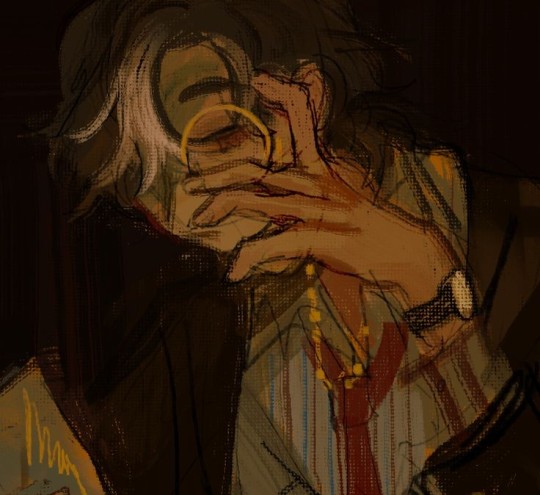
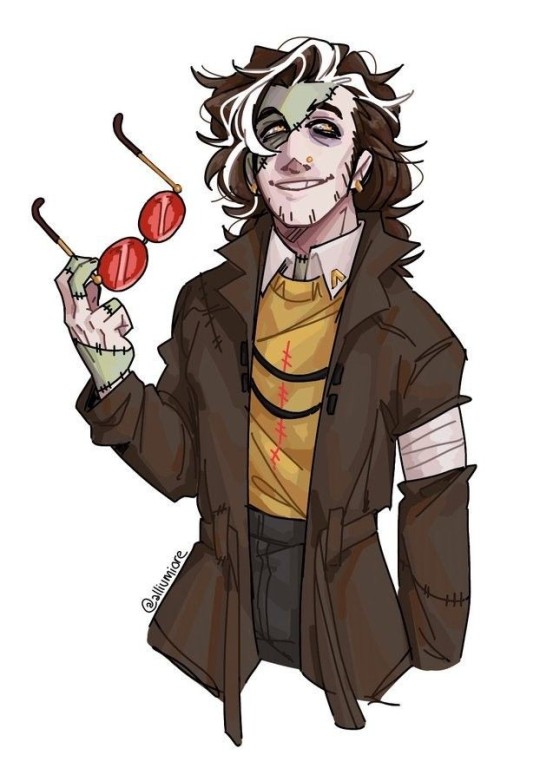
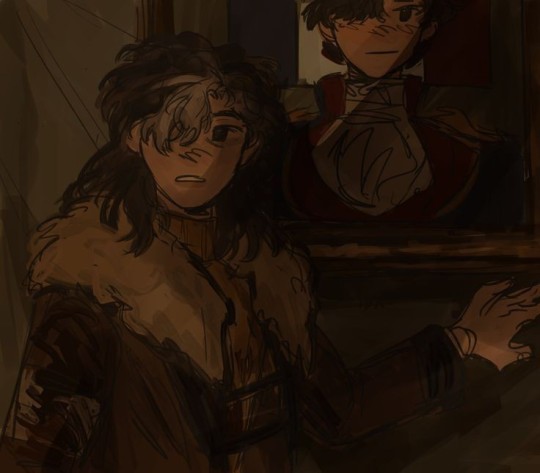

⋆₊ ♱ name: Dremyr, Tristin, Ridge, Fawn/Folly, Wolfen/Wolf, Iso, Dread, Morana, Sol,
⋆₊ ♱ age: Chrono 200+, Immortal, AgeForever
⋆₊ ♱ gender: EndermanGender, Xeno-Intersex, Masc Agender, Innoruien, SickThing, timarix
⋆₊ ♱ pronouns: He/Him/Thxt/Thxng/Hym/Faer/Bliss/Gods/Shi/Hirs/Muttself/Nxghtself
(Thxt/thxng is pronounced That thing, that things, that thingself. Nxght/Nxghtself is Night)
⋆₊ ♱ source: DSMP
Hir Revival involved more than a revival book, and is more medically trained due to it.
Is from the farlands before thxt thxng's home was destroyed
⋆₊ ♱ species: Disguised, Will often try an hide thxt thxng's identity from visual perception. Is a White Enderman. May have more sensitivities than normal Enderman alters. May disguise thxt thxngself to be another headmate, but with unmistakable details.
⋆₊ ♱ relationship ids: Hypersexual BPD, Guiltsexual, CupidoRomantic, AcaniRomantic
⋆₊ ♱ cis-ids: Autistic, BPD, NPD, Moral OCD, Mind controller, Programmer, Scarred, PermaMasked, PermaDisguised, Green Blood, Abusive, Manipulative, Grave Robber, Killer, Apathetic, Enderman, Hypersexual
⋆₊ ♱ trans-ids: TransPredator, TransSevHarmful, TransMortal, TransHuman, PanAccent, TransConabuse, TransPerci-Monster, TransASPD, TransDelusional, TransSemi-mute, TransGod, TransMinecraftDeity, TransController, TransPanOCD, TransSwordsman, TransPsychosis
⋆₊ ♱ extra-ids: TransPermaShapeshifter, PermaController, PermaProgrammer, PermaBloody, Permabloodstainedfur
⋆₊ ♱ roles: Apathy Holder/Cassmate, Interventioner, Bodily Caretaker, Apperance Morpher (More frequent to change the bodys outfit to hide more), Hypersexual Holder, Emergency Responder, Mortician, Death Distractor, Trauma Holder
⋆₊ ♱ triggers:
Pos: Stone Wall Stone Fence, Picking Fruit, Grave Robbing, Bridges, Painting, Cleaning, Panthers
Neu/Complicated: Tommy & Wilbur, Water, Ticking Clocks, Cabins, Snow, Being in friend groups
Neg: Empty Plains Fields, Butterflies, Being surrounded, Unwanted Sexualness, Bubbling Lava, Lava Sounds, Sam (gets angry rather than scared)
⋆₊ ♱ faceclaim:
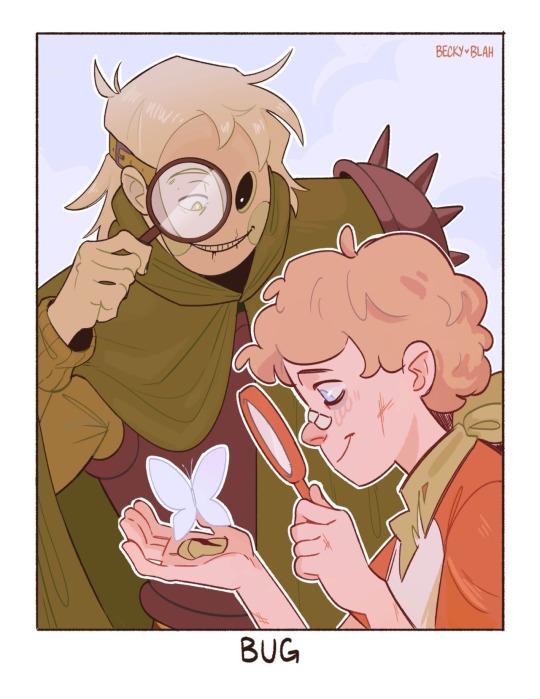
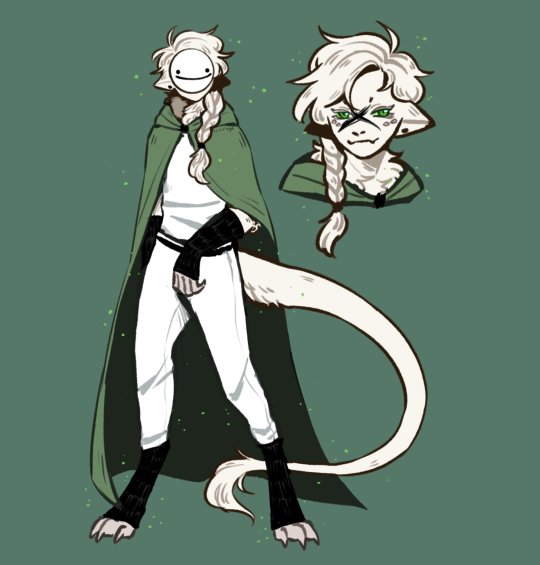
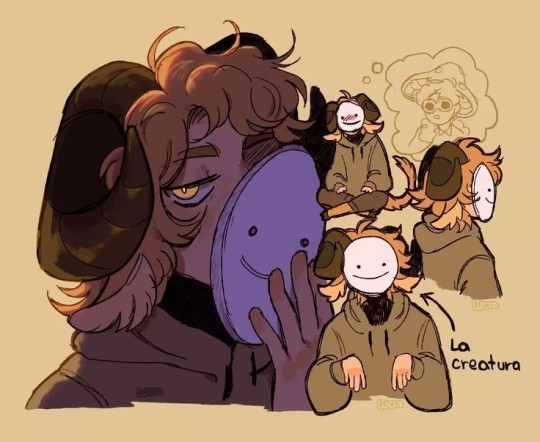
#Packets Alter Packs#Packets Posting#alter packs#build a headmate#alter creation#build an alter#build a system#headmate creation#headmate pack#pro rq 🌈🍓#radqueer 🍓🌈#rqc 🍓🌈#rq 🍓🌈#pro 🍓🌈#🍓🌈 safe#pro transplural#pro transharmful#pro transid#transplural#transid safe#transid#radqueer#pro endo#pro endogenic#AH!!! IM SO HAPPY FOR THIS BEING MY FIRST REQUEST!!!!!#I HOPE U GUYS LIKE IT TOO!!!!
18 notes
·
View notes
Text
Dead Apple Light Novel
Recently, I decided to buy LN 5, Dead Apple, purely because I’m a sucker for all of BSD’s light novels, so this post will revolve around what I took away from this novel.
Dead Apple is Canon
Since the story jumps around in the timeline a lot, I had originally thought that Dead Apple took place outside of canon (especially with Atsushi’s flashback).
However, a particular part of Asagiri’s afterword stuck out to me:
Now, allow me a moment to discuss some of the particulars of Dead Apple. Chronologically, the story takes place after the second season of the anime — in other words, after the war with the Guild, which puts Dead Apple somewhere between the ninth and tenth volumes of the manga.
The novel also ended up affecting the main story in numerous ways, and I’m sure this new experience will continue to influence my future work as well.
It’s not unusual for a light novel to insert itself into the main timeline (see 55 Minutes which takes place in the 10th volume), but it’s nice to have confirmation that the same applies to Dead Apple.
Of course, just because a work isn’t canon compliant (see BEAST), doesn’t mean that it has no potential for further analysis or it doesn’t bring any added complexity to the main plot. Regardless, this post serves as somewhat of a precursor to my other posts concerning Dead Apple since I have a tendency to talk about it a lot, and I’d like to establish a basis for a lot of my posts.
Differences between the Movie and Light Novel
In the afterword of the light novel, Hiro Iwahata (the author of this LN) said:
“Furthermore, I worked on this book under Asagiri’s supervision, meaning there are several lines in certain scenes that differ from the movie. It might even be fun comparing the two! Nothing would make me happier than the fans enjoying this novel alongside the movie.”
As per Iwahata’s request, I went into the light novel, looking for differences between it and the movie. However, the novel is surprisingly, almost identical to the movie (maybe not surprising considering it is a “movie novelization”).
Because the differences are so miniscule, I believe they hold an even greater significance, since Asagiri must have wanted to change these specific details for a certain reason.
Some of the differences I talk about might be unimportant, but I did my best to catch everything that was changed from the movie.
1. The movie doesn’t mention SKK as a part of the Dragon’s Head Conflict, but the novel says, “Some fought under the alias Twin Dark.”
This probably means that SKK became a pair either before the Dragon’s Head Conflict or during (although I’m pretty sure that the “organization” they destroyed over night was Shibusawa’s organization).
2. When Dazai says that he would’ve continued killing people in the mafia if it weren’t for Oda, Atsushi has little to no reaction in the movie; I would describe it as maybe a hesitant or concerned feeling.

In the novel, Atsushi has a more outward reaction.
““Huh...?!” Atsushi was baffled. He had no idea whether that was true. What did Dazai mean by that? (...) The melancholy Atsushi felt from Dazai had disappeared, and Dazai continued to speak in his usual lighthearted manner.”
Not only does he react verbally, but the novel also adds an inner monologue (mainly for Atsushi) that can’t be portrayed as well in movie format.
To me, this change highlights how Atsushi sees Dazai purely as a good person; he reacts in such a startled manner because he believes that Dazai is too good of a person to be in the mafia killing people (which we know Atsushi hates). This trend reoccurs throughout the story, of Atsushi turning a blind eye to Dazai’s “bad side.”
3. This one isn’t at all the movie’s fault, but the novel gives a lot more clues as to what the “dead apple” and the dagger in the apple motif represents.
The first time it appears is when Kunikida and Tanizaki meet the Special Division’s agent, but they find out that he’s already dead.
“It [the apple] was, without a doubt, a simple fruit... save for the fact that there was a knife sticking out of it as if to condemn the taste of sin. A blade had been driven into the symbol of original sin. A dreary, ominous aura, oozed from the ripe fruit like venom.
Throughout the novel, it seems to associate the “dead apple” motif with Fyodor pretty strongly, especially since this paragraph ties in Fyodor’s ideals nicely with the symbolism of the apple and dagger.
The apple represents sin, the very first sin — which you could interpret as sin at its purest — while the dagger represents the condemning of such sin. However, the apple can also potentially symbolize life, while the dagger stabbing into life can mean death.
Fyodor’s ideals revolve around “removing the sin” of ability users (represented by an apple in this case) but he does so through manipulation. The dagger is associated with stealth and deception, which is fitting with what Fyodor does to “remove the sin” of ability users.
However, he’s also taking the lives of ability users in this process, hence stabbing the apple, coincidentally committing another sin in his attempt to relinquish all sin.
4. In the “Snow White” Oda and Dazai flashback, everything is identical to the movie (word for word), but there is some additional narration.
“It was an alarming sight — Dazai sounded like he was in a trance. It was as if he was ignoring all this world had to offer while in pursuit of something else.”
I’ve talked about this particular scene before here, but the gist is that Dazai was discreetly talking about himself while referring to Snow White.
Dazai joined the mafia because he believed that the violence (or true human nature) would give him a reason to live, but we already know that this kind of thinking was flawed. Thus, this line most likely means that Dazai was ignoring all of the “good” qualities of the world while pursuing a reason to live, which inevitably wouldn’t work.
5. Right after the flashback, when Dazai takes the pill, the novel really sells the act of “Dazai walking towards his death and going to the evil side.”
Personally, this scene in the movie felt more open to interpretation after you’ve seen the ending. You could say that Dazai took the antidote and said “Being on the side that saves people is more beautiful,” because his plan is to continue living to save more people.
However, the novel throws away any possible double meaning with this paragraph:
“Dazai then reached for the pill with his bandaged hand, neatly picked it up, and slowly brought it to his lips — just like Snow White and the sweet, poisoned apple. The venomous red-and-pure-white-pill disappeared inside his mouth.”
After Dazai’s tangent on how Snow White could’ve committed suicide out of despair, the narration compares him directly to Snow White. With the added venomous pill stated outright, it only further cements the idea that Dazai’s actually committing suicide here.
I don’t particularly like this change, because it feels like this moment was set up entirely just to divert the audience’s expectations, rather than it be a standalone scene that makes sense when considering the rest of the story. (It might not necessarily be a change, possibly just a rough translation from movie to novel).
6. When Atsushi wakes up from his nightmare, there’s some additional inner monologue:
Everything’s okay. I’m not the same person I was when I lived at the orphanage. I have friends. I have a place where I belong — the Armed Detective Agency. Things are different now.
The anime (and in turn the movie) tends to downplay the effects of Atsushi’s trauma — probably due to the limitations of anime — but regardless the novel portrays it much better with how Atsushi’s trauma affects practically every aspect of his life.
7. I thought Fukuzawa’s ability only gave his subordinates control over their abilities, but the novel says:
“Yukichi Fukuzawa and his skill, All Men are Equal, a peculiar ability that allowed him to suppress and control his subordinates’ skills.”
Does this mean that Fukuzawa could control and suppress all of the agency’s abilities? It could be a weird translation, but it seems oddly specific.
8. This detail isn’t actually a novel exclusive, but it is an extremely small detail that I missed while watching the movie, so I figured I would add it here too.
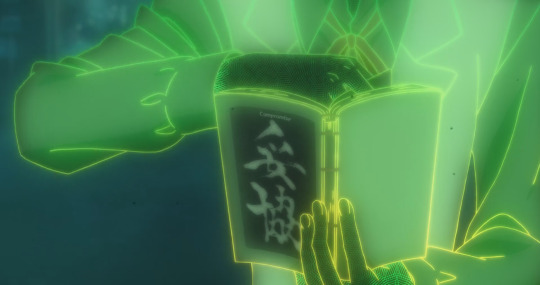
“the phantom’s notebook had the word Compromise written on the cover. A copy of himself that didn’t follow ideals but made compromises was an abomination to Kunikida.”
Considering how abilities act as the shadow to every character in this story, this is a nice detail that shows how Kunikida’s inner desire is to compromise, because carrying such heavy ideals is undoubtedly a burden. However, because he holds onto his ideals so strongly, it becomes his biggest weakness AND his biggest strength.
9. There’s a super small detail added to this scene with Dazai, Fyodor, and Shibusawa. When Dazai suggests that Shibusawa could be saved by an angel or a demon, the following exchange occurs:
“Hmm... Maybe an angel?” Dazai picked up the skull on the table. “Or maybe a demon?” “It’s obvious what both of your true intentions are, if you ask me.” The third man mirthfully cackled and took the skull from Dazai’s hand.
In the movie, Dazai doesn’t pick up anything, so as a result Fyodor doesn’t take anything from Dazai either.
Because Fyodor walked into the scene after Dazai suggested that an angel or demon would save Shibusawa, I strongly suspect that this was foreshadowing future events in which Fyodor does “save” Shibusawa by giving him his memories back.
The novel adds more to this foreshadowing by having Dazai pick up the skull before it’s taken by Fyodor — essentially having Fyodor take the cards out of Dazai’s hands and put them in his favor.
It’s also worth pointing out that the skull is also the object that Fyodor uses to revive Shibusawa into a supernatural ghost of some sorts at the end of the story.
10. This may be just a difference in translations but in the movie, Shibusawa refers to Fyodor as “Demon Fyodor-kun”, whereas in the novel Fyodor is called “Fyodor the Conjurer.” (Ango uses the Conjurer title as well).
In western esotericism, a conjurer is a person who summons supernatural beings, like spirits, demons, or God.
This slightly changes the connotation of Fyodor’s title from a inhuman being of pure malicious intent to just a human who summons these otherworldly beings. This idea also aligns with Shibusawa’s revival, since he’s some sort of supernatural ghost that was “summoned” by Fyodor.
11. Skipping past the parts where Kyouka and Akutagawa regain their abilities, and Chuuya talks to Ango in the government facility, (since they have little to no changes between the movie and the novel) there is a somewhat significant detail changed in Draconia once again with Dazai and Fyodor.
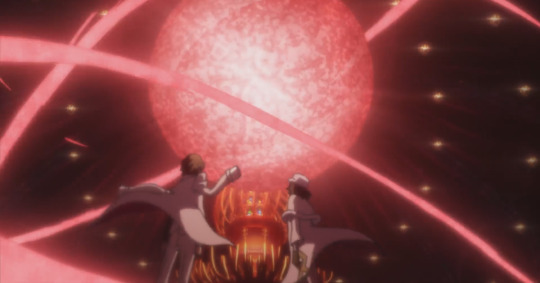
In the novel, this glowing ball of energy from the movie is actually described as an apple:
The two lights melted into one and spun until they formed a juicy sphere. They had produced a single apple — a juicy, poisoned apple red as blood.
It birthed a skill — and an extremely powerful one at that — the ability to absorb. Every last crystal adorning Draconia’s walls was sucked into the apple with intense force. Ten — a hundred — a thousand — two thousand — every last one was greedily devoured by the apple...
The apple swelled as it absorbed the numerous crystals until the red light became hotter than the surface of hell.
Since the “dead apple” motif aligns with Fyodor’s character, we can assume that the apple is representative of sin, and sin is associated with abilities, as Fyodor believes.
This strange poisoned apple is made of abilities and has an ability (the ability to absorb), and it commits a sin (greed) in its devouring of other abilities; it’s also hotter than “hell”, which is a very specific connection that leads me to this idea:
My theory is that a normal apple represents life, while a poisoned apple (or dead apple), indicative of a stained, impure life, represents sin. Fyodor believes abilities are akin to sin (what a clever rhyme), therefore all of their lives are sinful.
12. This is arguably the most insignificant change of this entire post, but I feel obligated to put it here regardless since it was different from the movie. When the Special Division detects the singularity of Shibusawa’s dragon form in the novel, it says:
“Abnormal values for singularity are increasing! They’re twice — no, 2.5 times higher than they were six years ago.”
In the movie, the number is five times higher instead.

Why did this number change? Is it significant? I honestly have no idea (I’m surprised I even caught this), but it’s there and I had to document it anyways.
13. The novel adds this narration for Shibusawa when he gets his memories back and he’s in the orphanage’s room with Atsushi:
“Shibusawa clearly recalled the events from six years ago. Fyodor had enticed him to go to the orphanage where he tortured a young Atsushi... until Atsushi fought back and killed him.”
There’s two things to take away from this: Fyodor had known Shibusawa for at least six years, and Fyodor had been planning the events of Dead Apple since at least six years ago.
I find it hard to believe that Fyodor’s plan was thwarted by Dazai, because of how Fyodor demonstrated his ability to plan ahead in the main series, but I’m not sure what the long term effects of this plan could be. If Shibusawa succeeded, then it could’ve aligned with the DOA’s goals, but once again I don’t think Fyodor’s plan was actually foiled.
14. Super minor once again, but right after Shibusawa gets revived, the last sentence of chapter 5 is,
“Nobody would ever see the smile on Fyodor’s face.”
Honestly, I think this was just added to create an ominous tone, but it’s a nice detail regardless.
15. As the red fog spreads across Yokohama, there’s a good part of exposition that connects the “dead apple” motif to Fyodor once again:
“After the red fog devoured the earth, the planet would undoubtedly look like a floating red apple from space. There would be no humans left on its surface, nor any signs they ever existed. It would be a true paradise, and with that, the Dead Apple would finally be complete. A dead planet covered in red fog — that was what Fyodor had planned and sought out.
Nothing other than death could wash away the original sin of man, so it was only fitting for the sin, which started with a fruit, to end with one as well.
It’s pretty long, but I like the way this passage is written, more specifically the last part since it fits well with the sinful poisoned apple idea.
It also aligns with Fyodor’s ideals of creating a true paradise, free of ability users. However, if Fyodor had planned to have the Earth covered in fog, that could mean that his plan was actually stopped by Dazai and Atsushi in the end.
16. Shibusawa has a few additional lines of dialogue when he talks to Atsushi in their final fight.
“The dragon and tiger... I see now why they are called rivals.”
The dragon and tiger have their roots in Chinese Buddhism, but to go further into that topic would make this already lengthy post even longer.
“Don’t get the wrong idea, though. I’m not blaming you for what happened.”
This line is a brief moment of weakness for Shibusawa, which is interesting in contrast to his strong will to kill Atsushi. Just as Atsushi learned to accept the past and the tiger’s ferocity, Shibusawa shares the same attitude by separating the blame from himself to just simply accepting the past for what happened.
17. In the aftermath of the last fight against Shibusawa, Atsushi and Kyouka meet up with Dazai.
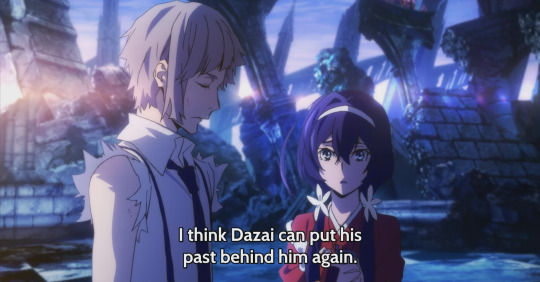
Kyouka asks, “Are you sure this is what you wanted?” which prompts two different responses in the movie and novel respectively.
In the movie, Atsushi says, “Just as Shibusawa was able to forget that he’d been killed before, I think Dazai can put his past behind him again. But this is fine.”
In the novel, Atsushi says:
“... I could probably seal away this memory just like how I’d forgotten I’d killed him before. But... I’m okay with this.”
I interpreted Kyouka’s question in the movie to be questioning Dazai’s loyalties, as he did betray everyone, and Atsushi responded in Dazai’s defense because he trusts him.
However, the novel does change Atsushi’s response to focus on himself rather than Dazai, which in turn changes the implications of Kyouka’s question.
Kyouka seems to be asking Atsushi whether he was okay with killing Shibusawa, and Atsushi responds by acknowledging that he did kill Shibusawa, and that’s okay. (a very clear development from the beginning of the story when he believed it was unnecessary to kill anyone, and he didn’t want to kill anyone)
18. In the epilogue, Ango talks about the underlying motivations behind the “Dead Apple” case. This change could be attributed to translation differences (like many others in this post), but the connotation does slightly differ from movie to novel.
In the movie, Ango says, “How is a man like Shibusawa, so intelligent that others look like alien creatures to him, to act, to be destroyed, or to be saved?”
In the novel, Ango says:
“Perhaps the two of them [Dazai and Fyodor] just wanted to get a glimpse of someone like them... Perhaps they wanted to see what he would do and how he would meet his demise... or perhaps how he would be saved.”
The movie simply poses a broad question of what would happen to Shibusawa, a person alienated from the rest of society.
The novel changes this to focus on Dazai and Fyodor’s perspective — two irredeemable aliens from society just like Shibusawa — executing this grand scheme out of curiosity to see what would happen to someone of the likes of them, and if there’s a possibility for redemption.
19. This is the final difference on this list, and it’s quite a large change. In Fyodor’s monologue at the very end of the story, he has a completely different tone from the movie to novel.
In the movie, Fyodor says, “But in order to end this world, rife with crime and punishment, I do need that book.”
The novel says:
Glittering high-rises and stately brick buildings stood side by side in this port city with its countless citizens who struggled against crime and punishment. “I think I’ve taken a liking to this city myself..” Fyodor took a bite of the apple in his hand, and the juicy nectar ran down his delicate fingers. “You’d all better be on your best behavior until next time.”
The reference to the book may have been removed for consistency with the main series, as the book is a part of the DOA’s plan (or more specifically Fukuchi).
It also seems like Fyodor has grown fond of the city, and no longer wants Yokohama to be destroyed, so it’s still possible that his plan deterred from what he had originally intended.
Beyond that, I’m not entirely sure why crime and punishment was mentioned, or why there’s such an ominous tone to his ending statement, but that’s up to personal interpretation.
That concludes the long list of extremely specific and minor differences between the Dead Apple movie and light novel!
Overall, I would say it’s worth checking out the light novel if you don’t have a strong grasp of the Dead Apple story, because it definitely presents the small intricacies of the plot in a more comprehensible way.
On a side note, the manga adaptation has a lot of noticeable differences from the movie and light novel, mostly with the addition of entirely new scenes (which you can read @buraihatranslations — what a shameless self plug). I would highly recommend reading it as those extra scenes are very amusing, to say the least without giving any spoilers.
Honestly, this post was a lot longer than I intended, but I hope you enjoyed it regardless. Thank you for reading!
410 notes
·
View notes
Text
I am so sorry, but I have so many feelings about this, this will be long. There's a story in the bible where Jesus' apostles ask him if a man is blind because his mother or his father sinned and Jesus chastises them and says neither, but instead so that the works of God are made manifest in him. There is no commandment or scripture or revelation that ever is there to put down or criticizes someone who is physically or mentally ill, only bad faith interpretations (if you pardon the pun) made by people who are generally looking to benefit themselves any way they can anyway. The god who's primary attributes are personifying love and personally going through everything we went through to absolutely ensure we would receive justice on every level isn't mad at anyone because their brain makes them hurt sometimes.
And I should add that when Jesus said the works of God should be made manifest in him, his language makes it clear that he is not talking about healing the man - or at least not only that - but all the things the man himself had manifested in his life. The works (plural, so not just this individual healing moment) of God that the man performed in a thousand silent ways both because and despite and a mixture of his disability which were overlooked or unrecognized by the people around him who debated which of his parents sinned in front of him. Likewise when we deal with medical issues of any kind we are often treated like we caused it by sinning in someway, and internalize those feelings. Pain feels more true because it's loud and we've been so gaslit by society that we're faking it that we cling as tight as we can to proof. But God saw the man's virtue and God sees still.
If you've waded through this far, people can and do often chose not to care. Sometimes it's a lack of emotional maturity (for a variety of reasons) and the part of their feelings that feels other people's pain isn't allowed to grow. Sometimes it comes from a place of trauma where caring was too hard because ______ and they chose to nurture that emotional blankness. Sometimes it comes from being plain overwhelmed so instead people chose to retreat from any feeling that is too big or unpleasant. Virtues and vices function identically in opposite directions. Learning patience takes time and effort, learning cruelty takes the same. One should never underestimate the effects of emotionally touching a hot stove, eventually the pain stops and then there's no feeling at all. When someone's personal philosophy centers around immediate personal benefit and not long term effects then anything that feels good right now is good and anything that feels bad right now is bad period. Guilt feels bad in the moment and sitting in the bathroom all shift playing games feels good in the moment, so no guilt and yes games.
Logically destroying your future is nonsensical, but if human beings were purely logical then we wouldn't be human.¯\_(ツ)_/¯ The deadly sins are deadly not because they're Big Bad but because of the way they warp thinking processes and only the person inside the sin can let themselves out - even when outside help may be necessary in the process. Sloth requires a sort of self-harm to the part of the self that cares about the individual and community. It's scary to think that it might be possible to do, and anxiety might insist you can do it on accident, but it is more like punching a bear while skydiving - easier to avoid then one would think if you avoid certain circumstances.
Hey who else here thinks sloth is a dumb sin and just sounds like mental illness raise your hands
#words words words#and i really do mean that this time#it's been a while since i wrote an essay#sloth
155 notes
·
View notes
Text
Lilith in the Birthchart
“Within Black Moon Lilith, we find a woman’s turmoils and fears, the balance between how people see women and how we wish to see women, the internal and external rejection of womanhood, absurd reactions and compensations to actively change perception (transformation), the snake. Lilith isn’t of lust, isn’t a creature, demon, seductress, witch, nor Adam ex-wife... She is purely a metaphor of young womanhood and coming to terms with woman’s fears and desires; the uniqueness of the female experience.” Look at this post here for my full interpretation of Black Moon Lilith.
I realize this post, as well as my other post on Lilith, plus other posts I’ve done on feminine asteroids, will be controversial to a lot of people as it heavily focuses on women/feminine experience. To me, I think the astrological placement of Lilith (among other certain placements) hold particular importance to the female experience. So I pardon my blatant exclusion of male experience and I can imagine that a lot of the themes I am describing can work in a male’s birth chart. The psychological history behind Lilith has strong connections to female representation which is why I interpret it this way. With that all said, everyone has both masculine and feminine energies working within their chart which is to be remembered.
Black Moon Lilith in the Birthchart
Interpret by house first, as the house Lilith is in uncovers more of the whereabouts to its themes in your life. Though, by sign will also uncover themes, especially in a strong sign such as Scorpio. Aspects to Lilith can also indicate the condition of the affected house.
I House/Aries Lilith here is on the forefront and becomes an integral part of the individual’s identity. Its as if Inanna herself is personified in the individual (especially true if Lilith conjuncts the ascendant!) and she is on a quest to carve her throne in the Huluppu tree. The fears enveloped here revolve around being true to oneself and having an authentic feminine experience in their lifetime. There are also fears of being perceived in an unfavoured way and others making poor assumptions about the individual. These individuals will go through many trials of what is means to be a woman, especially in very pivotal moments of their life. They’re going to go through many moments of questioning their identity and will likely struggle at times to accept that they are perfect just the way they are. These individuals may go out of their way to seek validation for who they are and these outlets aren’t always good (especially if Lilith is ill-aspected). Natural attractiveness is common for individuals with this goddess placement, but they should be wary of this power to draw energies force (Some already are and may even fear attraction of others, especially when its for superficial reasons). It’s important for the individual to stay with the right crowd and not worry so much about their authenticity as it comes more naturally than they think.
II House/Taurus Lilith in the house regarding value explores themes of self-value. Lilith at its worst here can manifest in issues dealing with body image; the individual may have trouble loving their body and neglect to care for it. The individual’s relationship with food and nutrition can be particularly troublesome, especially if Lilith is ill-aspected here. Compensation is another theme to follow as a consequence to issues dealing with self-value. The individual may compensate in areas where they feel inadequate with themselves by material means. Spoiling oneself, food, money, beauty, extreme alteration, or anything to mask one’s true self are all second house compensations Lilith looks for to feel better, worthy, or secure in this world. Remarkably, the individual’s capacity for transformation is great. If they can heal their wounds and fears around the value of themselves, they can redirect that perception of unreachable perfection into their work. Artists in particular can benefit from this redirection of energy. It’s really important for these individuals to navigate away from material things giving them importance to this world; every material thing they think they need is really just a compensation for something they failed to see within themselves that has always been there.
III House/Gemini Lilith here resembles a tale of trickery, when the goddess Inanna intoxicates “lord of wisdom,” Enki into giving her all of his knowledge and wisdom. Symbolically, Lilith holds all of truth, wisdom, and knowledge here. Particularly the theme of women holding knowledge and the empowerment in that is strong here as well. Individuals with this placement tend to be cunning; this placement is comparable to Mercury-Pluto or Mercury-Moon aspects. Lilith speaks through the individual, some of what the individual has to say evokes fear, though there is just as much power to negate and heal fear as well. Lilith here at its worst can make individuals liars and manipulators, at its best unravellers of mysteries and forecomings of truth. Since the third house has rulership over siblings and early education, this placement can have a “coming-of-age” theme to it. Often the fears and anxieties the individual has is stems from observing their siblings and peers go through their struggles at a young age and they reflect on what that means for them (especially for young girls). Some of these fears and insecurities from their youth stick with them and they continue to ponder their adolescence as an adult. These individuals tend to have a fixed perception (especially true if the third house is occupied by a fixed sign) of womanhood and aren’t afraid to speak their mind about it. They are easily disgusted and troubled by observing others with opposing perspectives. With that said, some of these individuals tend to be hypocritical and aren’t aware of it. The individual may need to learn to be more of a safe-haven for open discussion to work through their insecurities.
IV House/Cancer Lilith presenting itself in the first of the three soul houses demonstrates ancestral fear, turmoils, and mysteries. Often these individuals fears start out very subconsciously and are developed from witnessing other family members (maternal figures especially) go through something traumatic. Witnessing their mother struggle through their own perceptions of what it means to be a woman in this world has a tremendous effect on the individual, especially at a young age; it often shapes how the individual will view themselves and their place in the world. It can also make the individual have many preconceived ideas on motherhood, domestic life, and relationships between parents based on being their mother’s observer in their youth. If the relationship between the individual and their maternal figure(s) isn’t good, it can be difficult to address and heal these traumas. Sometimes these individuals can be total estranged from their maternal figures and have an unclear idea of what their stories are; many secrets can be kept from the individual and there can be a bit of loss in identity (e.g. no feminine guidance in youth/how to be feminine/rejection of femininity). The individual’s household can sometimes be a reflection of their inner turmoils, they may neglect making it their safe space or they see it as a cause to a lot of their issues. Lilith here can also express itself in a form of past life karma or a karmic cycle the individual may be in. The individual needs to work through what their fears, turmoils, and angers are tied to in order to break this cycle.
V House/Leo Lilith here is a trial of what a woman is allowed to do. Since the fifth house rules over creations and pleasures, there is a lot of experimentation in just that. The individuals feel as though push their limits and test the waters in everything because the world is antagonistic towards their identity. Their fear is being casted into an archetype; at an early age they would be introduced to concepts of how the world perceives the role of femininity. A lot of their behaviour can be excessive or reckless, especially in their youth. There is a tendency towards promiscuousness especially; they’re putting the two feminine archetypes on trial and attempting to destroy the notion that you can only be of the two based on what you do; the virgin Mary or the prostitute. Though a noble intention, these individuals can often be misguided with their excessive behaviours. They spend too much energy on trying to prove something to the world about their being when they don’t need to. Lilith here has the capacity to transform and redirect this noble energy into creative efforts. Artists can benefit with this placement as their creations are often thought provoking and, in essence, demonstrate trials of femininity. The creative expression of Lilith here is much more healing, gratifying, and gains more positive recognition. Lilith here can also indicate either the choice of not having children or that the individual’s child will be very Lilithian in nature.
VI House/Virgo Lilith here presents itself irrationally, particularly, and sporadically. Though the individual doesn’t feel Lilith’s influence on a constant, it can be experienced on a day to day basis temporarily while doing minute or seemingly regular things. The fears brought upon here correlate to injury or illness (diseases, losing limbs, loss of function, etc.). These individuals find themselves irrationally thinking of the “what ifs” of rather normal situations. It should be stressed though, that often these individual’s fears are often not debilitating, just invasive and vivid. However, a strong 6th house/Virgo influence coincide with Lilith being there can indicate some obsessive compulsive behaviours and just in general lots of situations where the individual feels the need to do something a certain way to negate harm. The other prominent theme of Lilith here is a women’s experience in the working world. The transition between a young, inexperienced woman to an experienced one is a pivotal moment in Lilith’s expression here. There may be many difficulties, assumptions, and fears correlated to getting work, job experience, and moving up in their field. The individual’s fears often are related to feeling inadequate based on their identity, presumptions about themselves, and inhibitions because of their heightened awareness that their identity (especially for women, as a woman) places them in a particular way in the world. Their own perceptions of themselves are often the most inhibiting; the best way to transform and feel empowered with Lilith here is to be unapologetically yourself and take the world by surprise.
VII House/Libra In the seventh house, Lilith expresses fears of counterparts, peers, and juxtapositions. Lilith here usually hints to a tainted perception of relationships developed at a young age (e.g. abusive relationships firsthand or observed). The individual can be very suspicious and distrusting of close relationships and partnerships, they are very skeptical of others motives, especially of the opposite sex. This may be troublesome for the individual in relationships as they can be suspicious of their partner even with constant reassurance and stability. These issues can only be healed over time with positive, healthy relationships. Lilith in the seventh house is also troubled by their perception of themselves in comparison to others and vice versa. In particular, the conscious awareness of differences (and similarities) between genders and gendered experiences. Alternatively, Lilith here manifests as the individual’s reflection in others. The individual encounters people whose stories inspire things within their identity they’ve failed to see before. The mirror Lilith presents to the individual can be empowering and beautiful or destructive and ugly. When the individual chooses to surround themselves with empowering and inspiring individuals, it will bring out the good Lilith has to offer, especially for female experiences.
VIII House/Scorpio Lilith presenting itself in the second of three soul houses demonstrates yet again, a level of ancestral fear, turmoils, and mysteries. Fears experienced on a more conscious level, but run as deep as their soul. Often their fears revolve around sexuality and severe distrust of other people’s motives. It’s very difficult for these individuals to ignore harsh realities and they may even go out of their way to witness gruesome things which awakens outrage within. These individuals can view sex and intimacy as something traumatic and have a difficult time opening up to their partners; intimacy requires a tremendous amount of trust. Even when that trust is gained, there can be a deeply rooted discomfort in being viewed in a lustful manner. They can be very hateful towards the opposite sex and protective of their own. These individuals hate (or fear) to appear small or vulnerable and may even act dominant or controlling in relationships. These individuals need to work towards trusting others in order to let go of the grip Lilith has here. Another theme Lilith expresses is a fear of death, fear of knowing, and fear of the occult. This can be especially difficult for a person who is psychically sensitive. The individual may go out of their way to inhibit or block their own gifts due to the fear of it showing something they were not prepared for. Again, trust is a big aspect of overcoming these fears, but also knowledge and perceptiveness to know how to keep oneself from harm.
IX House/Sagittarius Lilith in the ninth house carries some of the same themes as Lilith in the third, however the difference is that instead of fixed perceptions on womanhood, their perceptions are more like beliefs and morals. They think their beliefs are imperative and the highest of truths which ultimately can be dogmatic and misguided. Their fixed beliefs are usually rooted from fear and superstition. They can be just as hypocritical as Lilith in the third too, especially when their consciousness isn’t clear (drugs or alcohol or any sort of substance abuse involved). Inner insecurities need to be addressed and healed to have a more rational perspective on life. There is a hyperfixation on the higher learnings of womanhood, some of these individuals can become reclusive; some women with this placement even opt to not marry. These individuals find empowerment in independence. Lilith at its best here can become a teacher to others, particularly beneficial for people interested in women’s studies and women’s health; however these individuals should be wary of their biases and their perceptions that are deeply rooted in their personal experiences thus far. Themes of feminine ritual take place here as well, which is in part of their tendency to superstition. Individual’s ritualism is developed at a young age and becomes a prominent part of their truth and reality as an adult.
X House/Capricorn Lilith here can be rather difficult for the female experience. The themes brought upon here are a lot to do with the public’s speculation of the individual. These individuals tend to have a seemingly easy-breezy path towards the top of their field, in fact, one might say the top of their ambition drew them in as much as they drew it. However, Lilith here has a magnifying glass over it; the watchful eyes of the public seeing, judging, and speculating the individual’s every move. The individual may find themselves dealing with a lot of rumours about them, prosecution by association, misconceptions, unwanted drama, and assumptions. A lot of the troubles are correlated to society’s perception of how a woman should behave. The public sees the individual as the dark and mischievous version of Lilith, the public desires and feeds on that perception of the individual. As a result, the individual may purposefully act out or feel complete shame and go into hiding. Issues dealing with feeling vulnerable all the time because of their identity are very present within the individual. Lilith at its best here can make a notable feminine figurehead, the individual just needs to work on transforming the public’s perception of femininity as something empowering. The other theme with Lilith in the tenth house is potential issues with the paternal figure in the individual’s life. There’s potential that the paternal figure had a great impact on the core of individual’s feminine experience and perceptions in life.
XI House/Aquarius Lilith in the eleventh house deals with themes of the individual’s collective consciousness being at the core of their feminine experience. Collective consciousness usually meaning their friends; prominent, reality shaping experiences with their friends and peers at a young age are at the core of their insecurities, fears, and perceptions of feminine energy. This placement does demonstrate not so great relations with friends, especially female friends. In fact, that is Lilith in the eleventh house at its worst; bullying from female friends and the psychological damage from that. It’s very easy for individuals with this placement to alienate themselves from others based on negative experiences. At its best, collective consciousness can be beneficial for exploring and understanding femininity and female experience as a whole, but the individual with this placement will have to navigate through to find the right people, or their people. Individuals with this placement may be interested in helping others struggling with feminine identity and some of the struggles of womanhood as they are quite empathetic to that experience. Another theme with Lilith here is the value of platonic relations. Individuals with this placement struggle with the stage between a platonic relationship and blooming attraction. There’s a deep discomfort with it, especially if they value the relationship as just a friendship and nothing more. They can also be suspicious of the motives of new friendships, perhaps from deeply rooted insecurity or simply that they don’t want a romantic/sexual relationship.
XII House/Pisces Lilith presenting itself in the third and final soul house is completely unconscious; Lilith is asleep and almost absent here. Loss of feminine identity takes place here. Individuals with this placement will experience Lilith’s themes within their dreams and times of total darkness. Individuals with this placement aren’t always aware of their trauma, fears, or turmoils. There’s a chance something traumatic happened to them at a time they cannot remember or it’s something they blocked out entirely, but tends to haunts them within their dreams. These individuals tend to be very angry at themselves for things they cannot control and for things that are often not their fault. These individuals are also escapists; they are very susceptible to addiction or obsessive compulsive behaviours. Though, Most 12th house Lilith individuals escape through sleeping. Excessive sleeping, however, leads to guilt. These individuals fear death and don’t want to watch life pass them by. There’s a big theme here of push and pull; doing everything you can in life to not regret missing out and the absence of living life. Lilith here needs to seek balance and acceptance instead of pondering too much about what fate lies within them. The unconscious traumas within them need to be carefully addressed and healed as well to feel comfortable with their identity and place in this world (especially as a woman).
2K notes
·
View notes
Text
twenty years later.
I am so deeply sorry for everything the world will put you through and for the things other people will do to you, myself included. You have a light in you, one so big and bright that others will try to put it out. You are so very intelligent and so very kind. A natural storyteller, a lover, a gentle soul meant to guide others through the world with your compassion and understanding. You won’t be given the love and celebration you deserve.
Your mother will be triggered by your youth, your potential, your conviction, and your thirst for knowledge. She was raised to believe that taking up space was wrong. That it made her difficult, irritating, and ugly. The fact that you take up space in every room without fear or self hatred will make her angry for the parts of herself that she can’t claim. She will stifle you, make you question the parts of yourself that make you a force to be reckoned with. From the doubts and irritation that she pours into you will grow hatred for the parts of yourself that make you so very powerful, so very unique, and so very happy.
Your stepmother will see you as someone to compete with. She will torment you, knock you down every chance she gets, and try her hardest to take away any potential you have to become better than her. She will make you think you are undeserving of her attention because you’re too fat, then will fain disgust at your thinness. She will subliminally tell you day in and day out what you need to do to acquire her love and affection, and, when you do it, she will use your compliance as yet another reason to hate you. Truthfully, there is nothing you could ever do to make her tolerate you, let alone love you. But you have so much love to give, and you are still under the impression that everyone else does too. So you will starve yourself and exercise yourself to the brink of death. You will dim your light and fall deeper and deeper into her game. You will inevitably loose, and you will hate yourself for it. Cut yourself. Burn yourself. Isolate yourself. You will spend every day wondering how you became such a disgusting and unloveable creature without ever realizing that you are not the horrid thing, rather that you were manipulated into believing that the parts of you that are inherent and beautiful are shameful, appalling, and unloveable.
You are like your father in ways that still confuse me. It hurts me to know that you are so very much like the man who will be incapable of fighting for you, and who will be your first true heartbreak and betrayal. It destroys me to know that he will use the parts of himself that exist in you to manipulate you into thinking you are a rage filled beast when in reality you are a confused little girl who just wants someone - anyone, to hold her hand and walk through the world with her. He gave you your intelligence, your fire, your capacity for debate, your thirst for knowledge, your compassion, your ability to disappear into books and to befriend the ink on a page more easily than you could other people. He gave you the parts of himself that were pure and beautiful. When everything is taken away from him, he will burn every part of himself that reminds him of what he lost straight to the ground. You will be nothing more than collateral damage.
The first two decades of your life will be so utterly painful. So confusing. Every aspect of your being will be confused, twisted, and mutilated. You will question every decision you make, and every single day you will be stuck in an endless labyrinth, in which every corner you turn as you try to exercise your own identity will be met with a hard wall of anger and guilt and hate, put in place by the adults who were not adult enough to keep their traumas to themselves, and who instead perpetuated them onto you.
I am so very sorry that you will go through all of this. Im so very sorry your light will be extinguished and your identity will erode into something unrecognizable. I am so very sorry that you will loose so many people and so many parts of yourself and that you will experience so much pain and suffering. I am so very sorry that the generations before you couldn’t deal with their shit and make sure that they didn’t pass it on to innocent little girls who are born to slay dragons and save the world. I’m so very sorry everyone you should be able to trust will make you believe that you are worthless if you don’t work yourself to death trying to meet their expectations without ever stopping to consider what will make you feel happy and safe.
You no longer live in this world. You exist purely in my memories, my emotions, and some very far off corner of my consciousness. You are hiding, so afraid, so hurt, and so lost. Everything that should have never happened did, and it changed us, and bent us, and eventually you grew into me, a person who is so used to hating every part of herself that she broke herself in her attempt to be perfect enough to be loveable, and who almost lost everything she loved in the process. I’m learning now. Learning to take care of you, nurture you, and love you, all in the hopes that I can find myself in you. Truthfully, I have no clue who I am or who I’m supposed to be, but I think I know who you are, and I think I can shower you with the love and appreciation that you deserved but never received. I hope that if I’m patient, and if I can become the one to hold your hand and walk through the world with you, that you won’t be so scared anymore, and that you’ll come out again and help me learn to who I am and how I can love the version of me that isn’t so little anymore as much as I love you.
#recovery#poetry#healing#narcissist#parents#inner child#peace#mental health#support#identity#eating disoder recovery#late night#letters#writing#therapy#personhood#coffee#cascadia#coffeeincascadia#emotion#relationship#diary#art
4 notes
·
View notes
Text
Sen Çal Kapımı ep 48 asks
THE EPISODE WHERE THEY FINALLY GOT MARRIED!!!!!!!
SERKAN AND EDA ARE MARRIED!!
FINALLY!
YES!!!!!!!!!
Okay, now that I got that out of my system, asks under the read more.
andhewonherheart asked: @andhewonherheart I love that Bolat is Aydan’s last name, not Alptekin’s. I know it’s a little of a retcon, but this way we don’t need to worry about Serkan and his family carrying that man’s name. And Aydan would be a woman that strongarms her husband into taking her last name.
I LOVED THIS! I sat up straight when Kemal made the comment about Alptekin taking her name and cheered. Seriously. What a great turn of events. Serkan is so attached to his name, it’s nice that he didn’t have to have an identity crisis over that on top of everything else. And now it’s not weird for Eda and Kiraz to take his name after finding out Kemal is actually his father, which I wanted for them. I wanted them all to be tied together with a name, to have that feeling of belonging. Plus, as you say, it’s nice they don’t have the name of that man.
I will say one thing, though... is it really a retcon? Did they ever say Bolat was Alptekin’s given last name? I don’t think they did (but who knows with the iffy translations we all rely on). I do remember Aydan bragging on the lineage of the Bolats in a very early episode (maybe 2?) and at the time I thought it was odd that she was so proud of the lineage when she just married into it, especially because if memory serves she was sort of heckling Eda, who was marrying a Bolat. Perhaps this was always intended, and we only feel like it’s a retcon because we’re programmed by a patriarchal society to assume a woman always take a man’s last name?
Anonymous asked: I don’t really like the idea of Serkan giving up Art Life. I understand the symbolism of him giving up his work for his family, but I would’ve preferred that he finds a balance, like he did with bringing Kiraz to work. I feel like that would’ve been a more rounded way of approaching his character, instead of swinging him in the other direction, now instead of having only work, he only has his family. When he could have both.
He will have both. Eventually. He’ll figure it out and get back to where he was. He is Serkan Bolat after all. You don’t expect him to sit idle for any length of time, do you?
As much as part of me was just torn up at him selling his stake in the company, I thought it was really beautiful. Sure, balance is good, but this is a man who has ripped out Eda’s heart twice by telling her that work is more important than she is to him. This is a man who left ON HIS WEDDING DAY, who put work first ON HIS WEDDING DAY, who got on a plane ON HIS WEDDING DAY because he tried to balance (do both, go to Italy and get married in one day) and it ended up putting them both through hell and almost ruining both of their lives.
Picture how you would feel if the person you were marrying decided to fly to another country on your wedding day?
So I disagree with you. I’m more than fine with Serkan Bolat unequivocally putting Eda first over his career and company. After everything they’ve been though, and her insecurities in that area, it was incredibly important and now she will never, ever doubt where his heart lies. It’s with her. She (and their family) is his top priority.
Besides, the show started with Serkan having destroyed Eda’s dream of studying to become a landscape architect in Italy, it’s quite poetic that he gave up something substantial so that she could realize a dream of working as a landscape architect on her dream project in Italy.
I’m pretty sure she’ll be more than happy to help rebuild their company. Together.
Anonymous asked: i know you said in your previous ask round-up that as far as the actual proposal goes, nothing would top that speech in 27.. i was wondering how you felt about his speech this episode. sure, it wasn't actually the proposal, more like a "reception" toast, but for me i think it was my favorite speech, or at least top 3, serkan has said to/about eda.. just pure love about their journey together and a huge full circle moment with that video from the pilot episode.
YEEEEEESSSSSS. I so agree with this, and actually thought exactly this while watching. It was a marvelous speech and while, as you say, it was presented as more of a toast, it was really more of a wedding vow.
I loved it. And I’ve rewatched it multiple times and I plan to watch it many times more. As always Kerem and Hande were excellent in the scene. Eda and Serkan were in front of their friends and family, but they were so focused in on one another they might as well have been alone. The emotion was palpable.
She is love. Dang, Serkan! He’s mentioned love at first sight a couple of times, it was nice that in this moment he gave another nod to that.
Loved the call back to the video from the first episode, it worked really well, especially to remind us of how it all started and how she felt like he destroyed her dream. That segued into him mentioned them destroying each other’s dreams. As I said above, quite poetic, especially since he then put his money where his mouth was by the end of the episode and destroyed his dream to preserve hers.
Well done, show.
Anonymous asked: i have loved the tone of this season so much. none of the drama we have is super heavy, outside of the kiraz reveal which was given the angst and importance it should have bc of how it important it was. otherwise, we've had happy (now married!) edser coming back together and now facing trouble and issues as a couple! this was basically all i wanted for them since 28!
Yes, me too. I really enjoy the tone this season. As you say, it’s not super heavy, the melodrama is at a minimum, most things are light and fluffy and even heavy issues are played with a light hand.
For me, I’ve really enjoyed this season and I’m super glad we got it. I think COVID did us one favor by shutting down production when it did and forcing them to reevaluate what they were doing. If they hadn’t I’m guessing the show would have continued in a very messy and directionless manner, with lots of melodrama and storylines that would have been traumatic to watch.
Season 2 has direction and purpose and a plan and once we got past the horrified shock of the time jump and the secret daughter (which I grant you was no small feat) it’s pretty much been trauma free.
Anonymous asked: After watching the episode, I'm lowkey disappointed. we did get Pretty Woman SCK-style. I was promised Serkan as a gigilo and Eda encouraging it!!!!! LOL, jokes aside, I'll never forget the outrage over that fragman over "harassment" or "prostitution" of all things when the actual dinner scene lasted 3 minutes, Eda was being at the hotel the whole time, and the scene where people thought she was encouraging him was about her project. Almost 50 eps and you would ppl would learn how fragmans work.
The fragman was insanely misleading, but lots of them are, so you would think they would have figured it out by now, but nope! A large swath of people really embarrassed themselves with their complete over reaction to something that turned out to be nothing like they thought.
Thankfully Serkan was entirely in the dark about how dire the situation was and why Eda was pushing him to make nice with Deniz, and only humored Deniz very unwillingly and then completely cut ties with her. I think the best part was the least shocking twist ever... that the Serkan staying in her room line was an actual joke on the show. Come on, kids, it was pretty obvious to anyone with a brain that Serkan would never actually consider staying with her, and certainly not just days after he got married. Preposterous!
Having said that, I do agree with people who think that Deniz being obsessed with him to that degree is dumb. There is a thread of misogyny and internalized misogyny (depending on which writers) running through the writing of these female guest characters who come in and absolutely shed all dignity, sanity and common sense when it comes to Serkan. Selin, Balca, the actress and Deniz. Good grief. However, I just don’t care enough to get pissy. If that’s what they’ve come up with to fuel the jealousy trope that apparently is a must for Turkish dizis without having Serkan ever have eyes for anyone but Eda, then so be it.
The formula is more than obvious by now, so I’m not sure why some folks made asses of themselves jumping to other conclusions.
#Sen Çal Kapımı#Sen Cal kapimi#edser#sckask#asklizac#sck episode discussion#edser discussion#sck 2x48#anonymous
17 notes
·
View notes
Text
As TMA keeps bringing up possible ways the story could end and knocking them down, I thought - what the hell, I’m going to make a huge list of all the endings I can think of and how likely they seem at this point. I’m constantly doing this in my head anyway, might as well type it all out.
There’s two columns as far as I’m concerned. One is “fate of world,” the other is “fate of Jon and Martin.” So I’ve got a list for each.
(I am also interested in the fates of the other characters, but at this point I think Melanie and Georgie’s fate is likely to be whatever “fate of world” is, and that Basira is either going to be in the same boat or die as part of her character arc.)
Fate of the World:
Entities are destroyed/banished, world goes back to normal but without monsters anymore.
Not impossible, but I have doubts. If the world is truly fixed, it will probably mean the characters successfully and heroically sacrificed themselves to save everyone and . . . that just doesn’t feel like the story Jonny Sims is telling, not to me at least. But I could be wrong.
Entities are destroyed, world is scarred in some way. (i.e., torture stops but all the nightmare domains are still there, no one can feel fear anymore, mass trauma/death, etc.)
Interesting to think about, not sure where they’d go with this one. Entities are sent back to being “just outside our universe,” world becomes what it was before the apocalypse. Possible. A return to the status quo before the entire podcast started would hammer in the theme of “the evil system is overwhelming and can’t be easily changed.” Though I would wager that the events of the story are ultimately going to change something for the world, even if (probably) it’s for the worse. No change to the world at all, it stays exactly as it is. Seems unlikely purely because I think if Jonny Sims was going to do this he’d have ended the series on MAG 160. “The apocalyptic scenario that we doubted could change really won’t change” isn’t nearly as strong a blow as “the most terrifying apocalypse possible is happening” as an ending. The world is freed from the Entities, but at the cost of allowing them to spread to other worlds. I wouldn’t be surprised if this option is at least presented. The “save your world at the cost of others” scenario does sound like a choice that could be put in front of our characters. It’s hard to imagine them knowingly taking this option, but who knows? The world remains as it is, and the Entities spread to other worlds.
Honestly this feels like the most likely scenario to me now, probably a result of the main characters trying to do something good.
The world remains as it is, but Jon takes over and shifts the fear around.
Seriously doubt this one, they brought it up and dismissed it pretty hard. I can’t see Jon doing it if Martin is alive, and if he dies I think Jon would be more likely to do something self-obliterating. The only scenario where I could see this would be “Martin dies and Jon gives up on trying or caring about anything, resigns himself to accepting the evil system as inescapable.” Which would certainly be tragic, (and depressing!) but doesn’t seem likely to me.
Jon takes over and is able to meaningfully change the world from its current state.
Even less likely than the above scenario.
The world can’t be fixed, so it’s utterly destroyed/mercy killed.
It could be seen as a better option than the others that are available, but that assumes it’s even possible.
We get the time travel ending after all, but only as an endless inescapable cycle that the characters can’t change.
*throws up hands* I don’t know I’m just spitballing now.
Fate of Jon and Martin:
They die together or meet a fate worse than death together, saving the world.
Possible, but I already expressed my doubts about a successful “save everyone through self-sacrifice” ending.
Jon dies saving the world, Martin lives and is sad/Martin dies saving the world, Jon either dies without the Eye or lives on having lost his consciousness or memory or identity.
See above.
They save the world without dying. Without the Eye, Jon either dies and Martin mourns or he loses himself and Martin takes care of him.
See above, also they talked about this and accepted the possibility together so it ain’t gonna be that.
They die together or meet a fate worse than death together, making things worse in the process.
Seems more likely than them dying to make things better, honestly.
They die together or meet a fate worse than death together, making things slightly better or giving the world a minor reprieve, but ultimately not saving anyone, aka the Bifrost Incident ending. (Or they die together mercy killing the world.)
Honestly this has seemed like a significant possibility to me for a while, but who knows??
Martin dies or meets some horrific fate, pushing Jon to some extreme act (or just letting him crumble into despair.)
Seems way less likely now than it did before MAG 196! Feels like if this was the route Jonny Sims was going to go, he’d have done the Spiders Martin ending, but could still be possible.
The world stays the same and Martin asks Jon to kill him. Jon either agrees and falls into despair or refuses and we’re left with a big “now what”?
Depressing! I hate it!! :D But who knows!!?
The world stays the same, Martin and Jon both change their minds and decide to just rule their domains so that they can both live and be with each other on some level.
Very unlikely given their character arcs.
Jon dies/is irretrievably trapped without the world changing. Martin is alive, unable to die, and forced to resign himself to living off the suffering of those in his domain.
Certainly tragic and depressing, but feels extremely unlikely after Quiet.
Jon dies/is irretrievably trapped without the world changing. Martin somehow figures out a way to fix/improve things. He either dies/has a fate worse than death in the process, or lives and is sad.
Putting the fate of everything in Martin’s hands could pay off the “you have to make a proper choice” idea, but for now I have no idea what he could do.
The world stays fucked but they escape to another dimension where they can be happy but have to live with the guilt of abandoning everything.
Doubt they’d be this lucky, tbh.
42 notes
·
View notes
Text
Mahiru excuses
How is it that Mahiru is guilt-free of all the garbage that she has done based on always the same, "possessed by demons" and that is the excuse for every sinister act she has done, the worst they excuse her actions as a child as if she would have actually been an innocent, sweet and loving girl .. In another excuse .. "Their meeting was planned by saito" .. (Sometimes I wonder if it is me or there are people who ignore the details) .. another excuse is "Shikamadouji is the great master and he's been possessing the hiragi family and manipulating them in everything they have done" excusing not only mahiru but the hiragi family. Another of the excuses and the worst to justify the abuse and genocide is "it's all in the name of love, protection and salvation of the world" which gives her the right bcs her only dream was to be a normal girl, who wanted to get married and have childs.
First: even if their meeting was planned by Saito, she knew very well who was ichinose's family and she cared little and nothing about damaging them bcs her intention was that her father would be furious for going to see guren .. If no one can't see that Mahiru already showed signs of being controlling, narcissistic, irritating, manipulative, and that she began to forge Guren's mind based on turning him into something that he wasn't and Guren was fine being the way he was, he felt good, normal. Do you really think that constantly pushing, harassing, and forcing a person to love you is being sweet, innocent, and a cute little girl? Even more shifting the blame on Guren, when her family came to question ichinose's family. This is loving someone?
"Also, even if I am being found, will Guren become strong and protect me right?"
“Because talking with the child of trash Ichinose House, must be the thing father despise most.
So there is something wrong here, that is not love, much less using the word "love" based on pure manipulation. Mahiru's "love" never existed. It's obvious that since then, Guren began to feel weak, physically and mentally, an ichinose rat. If Mahiru really loved Guren and vice versa, look at Resurrection as Guren makes it clear and realizes that "she has been manipulating him since the moment they met, that is, from 5 years old to 16 and still does. Stop calling emotional abuse as love. even more so when he doubts his feelings all the time. And even though their meeting was planned by saito, in resurrection guren asks himself .. "why we fall so fast". Bcs guren was never in love. If your feelings are clear, you don't doubt that you simply love that person. It was never love from either parts. Love without boundaries is not love at all; it is obsession where the end of getting one’s unhealthy needs met justifies the means of destroying another person.
Second: "the excuse of demonic possession" Mahiru could have been born with a demon, but she made it clear that she was experimenting with herself and could control it and in the novel more than once she showed that she could control them, in fact she controls them and makes guren feel miserable constantly using guilty tactics and here it is the same with tenri hiragi, it is true that he was possessed by shikama, but even so he was aware of it and it was fine about it bcs he love being powerful, the same is for mahiru, she did this the same to herself bcs she wanted it that way, she made it very clear several times, the worst thing is to say that even when she transformed into a vampire the demons continued to influence her. Didn't mahiru make it clear that the demonic power she had was not enough and wanted it more? So she became a vampire, mahiru, her decisions, her actions were decisions made by mahiru hiragi herself, her demons, transforming into a vampire were her additions to obtain more power, she always showed that she was aware of what she was doing and doesn't cared about hurting others in the process and worse still she didn't feel or feel any remorse, bcs of course it is all "in the name of love towards Shinoa and Guren". Killing Guren's friends was out of jealousy and envy, beyond making Guren pull the trigger, which was perfect, two birds with one shot. And here again it's the same shifting the blame on guren.
Thirst: "everything mahiru has done is shikamadouji's fault .. Beyond that shikamadoji is the great master.. They cannot blame him for the decisions that each person makes, and each one made. It is clear in resurrection that saito makes it clear to guren about the big master. Shikamadoji has no interest in the human heart. What you think, how you live who you love or hate. Everything is meaningless for him. In other words, the decisions that each one makes are their own, mahiru made her decisions, it is unbelievable that one can think that bcs there is a master behind hiragi's family, they were not able to live as they decided. If he had wanted to kill ichinose's family he would have done it a long time ago, if he had wanted to kill sayuri, shigure also especially goshi and mito that belonged to hiragi's house, and they forged a friendship with guren and killing them would be a good reason, at least for the hiragis, not to mention shinya who could have been killed long ago. Mahiru from the beginning wanted to get rid of them. They were just a nuisance to her, just like she treats every nuisance on her way, kills them.
Mahiru made it very clear and this is the world for her. She doesn't care about a single human life.
"Guren's friends have nothing to do with her, they are pathetic guren' s attachment . " If we work together, I'm sure the two of us will be able to perfect this power. No one will be able to stand against us. No one will ever get in our way again. For now, all you have to worry about is killing them. Take the next step forward, Guren. Claim your power.
"I'm trying to be with you, Guren. To live with you, even if it's in the next world. Even if it’s in a world where mankind can no longer survive. But for that to happen, we're going to have to be demons."
I will never understand how we talk about mahiru's love for guren and guren for her when this is what she's done to guren since always.. Emotional abuse include verbal aggression, intimidation, manipulation, and humiliation, which most often unfolds as a pattern of behavior over time that aims to diminish another person's sense of identity, dignity and self worth, and which often results in anxiety, depression, suicidal thoughts or behaviors, and post-traumatic stress disorder (PTSD). And that's what love is? Guren not only suffers from all this but also from emotional trauma. That was the "love" that Guren felt towards Mahiru.
Mahiru is a narcissistic psychopath. If we believe that their relationship would have been eternal and full of love, we should see more deeply. Mahiru was already toxic since child. Guren's life would have been the same as it was in catastrophe, and as it's now. Do you think guren would have had a normal life with mahiru when she didn't mind hurting guren's family as a child and even as teenager? It would have been the same, only in this case we used the excuse of her possession. Mahiru is her true self even with the demons.
Love is something that is safe, supportive, trusting and respectful. Abuse is not any of these things; it's about power and control.
Last but not less important .. shinoa .. I see that the physical abuse is justified on the basis of .. "she may be twisted but in her way she cared about shinoa" .. The brutal abuse towards shinoa is justified again on "the demons" If you love your sister, look for other ways, because there are thousands of ways, that is not even a way to protect much less with the excuse of "possession" and in case no one didn't notice it, Shinoa was already emotionless bcs they were experiment with her like if was normal .. This is not care, or love, it is brutal. And here I cannot blame shinoa bcs for her, abuse is fine in the name of love, shinoa already being abused in experiments is normal, and it is not like she could understand it bcs to her it was " i'm not good enough" and just had only 4 years old, there is a big difference between shinoa and mahiru at that age. Mahiru 5 years aware of what she was doing and wanting, shinoa innocent girl, who already showed signs of depression, low self esteem, stress and hadn't self worth. Shinoa justifies the abuse as love bcs she feels that the only person who loves her is mahiru, even having 16 years after being abused by mahiru she sees it as an act of love and it is wrong, bcs shinoa's brain is completely damaged seeing abuse as love, it's the same case of guren. They both suffered and continue to suffer abuse, so where is the justification towards mahiru for brutally beating shinoa for love when shinoa was already showing serious signs emotional problems before the brutal beat. There is no justification.
Mahiru is nothing more than a physical and emotional abuser who has done nothing but cause severe emotional trauma to people and commit atrocious acts with the same excuse and justification as always "love".
I can't understand why are so many excuses toward her, like if nothing she has done were her will. Mahiru is evil, stop justify her and excuses her actions in the name of "love".
(@dulciasouls1 hope you like it bcs i know this thing is bother you, and i understand that so well)
92 notes
·
View notes
Text
TROS spat in the face of every single abused child who was looking to this fairytale for hope. The sequel trilogy wasn’t about a farm boy looking for adventure or even an abused child falling to villainy, it was about three abused children from the different class systems all rising out of trauma and dysfunction. This was our fairytale, our story, and JJ Abrams perverted it into abuse apologist propaganda in a pathetically desperate attempt to appease the most hateful groups of fans who never understood or appreciated the story to begin with (which is why the story had to be butchered in order to appease them).
1.) Rey
Rey’s parents selling her for profit into slavery was portrayed as a good, loving thing. Child trafficking was literally portrayed as excusable, and even loving, in this children’s film. Just let that sink in for a second.
What is the message there? If your parents did something horrible that caused you years of trauma and torment, you should just not lose faith in them because they may have had a good reason (even if you have no evidence of that). Maybe a space wizard who has been dead for decades forced them to traffic you. This scene makes me want to vomit. This is how a children’s fairytale portrayed parents who sell their children into trafficking:
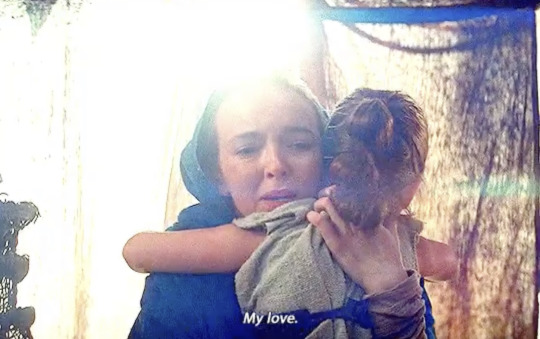
There is no excuse for this. Rey’s parentage was solved. Her identity crisis was over. This wasn’t needed except to force this abuse apologist message. Oh, and of course to feed the sexist fanboys a bit of eugenics to make them stop whining about how a woman could possibly be important and powerful.
TLJ was about Rey discovering her identity and letting go of her unhealthy, irrational dependency on parents who she never knew, who sold her to an abuser and left her to half-starve alone in a desert. TROS decided to give her a new identity crisis out of literally nowhere just so they could erase all that “You are not your parents, even if your parents don’t love you and/or aren’t special, you are still special and still deserving of love. You can find belonging ahead of you.” stuff with dynastic “Actually, your blood family does entirely define your identity and you should always assume they’re right even when all evidence points otherwise, just ignore your own trauma and blame it on a dead space wizard.”
The whole Rey Palpatine thing left a very bad taste in my mouth. Not just because it’s fucking stupid and something Reddit would write, but because Rey was horrible in TROS. She acted like she was possessed by Palpatine, she stabbed Ben (who she cares for and always had compassion for) to kill while he was distracted. She suddenly acted like she didn’t care about anyone around her. She just overall acted unrecognizable from the warm, loving, empathetic woman we saw in TFA and TLJ. The message here is clearly that because she has this “bad blood”, Rey can’t have an identity for herself. The only thing that saves her is taking on the identity of the good guys, she never finds her own. All the traits she’s had up until now don’t matter, who she actually is doesn’t matter. All that matters is what man’s blood runs through her veins. All Rey is is someone’s granddaughter, because if she wasn’t, then she’d really be nobody.
And thus, JJ Abrams decided that “Anyone can be special, even nobodies. Your worth is not defined by your class or your background.” was a stupid message and instead it should be pure eugenic “You’re only special if you have important people blood/name. Your identity is entirely your (male) family, not your own. No silly woman could have power of her own!”
Rey taking on the name of Skywalker is an utterly shallow attempt to fix the fact that they took every bit of Rey’s real identity from her, took half her soul (Ben is her dyad, two that are one), and then left her alone on a desert planet as if to say that her “true self” is the abused child she once was and that she can’t actually escape that. The moral of this fairytale was “You don’t need friends or love, as long as you have a glow stick (material possessions) and a super duper special name that makes you important (which you weren’t before, you were nobody).”
Not to mention that Rey basically named herself after Luke, no one else she knew actually used that name. And Luke didn’t do anything to deserve that, he rejected her at every single opportunity and only did the bare minimum to help her after being berated into it. Han was her surrogate father and the first person to offer her a life outside of Jakku. Leia was her loving mentor and pseudo-mother. Ben was the love of her life who has always been there for her when she needed someone to confide it, someone to see her true self and tell her she wasn’t alone. Luke was nothing but some cranky old guy who made her feel awful about herself and never accepted her (not to mention telling her she was inherently dangerous and also trying to murder her soulmate when he was a child which the real Rey was furious about).
2.) Finn
Finn’s character has not been given much in terms of development. For the most part, he’s been reduced to “Rey’s friend” and then “Finn’s friend”, with a little moment in there where he got to be with Rose and have his own identity but TROS of course decided to reward racist bullies and cut out Rose instead of giving the rest of the fans a satisfying story.
In TROS though, the one thing that Finn actually did that was heroic by himself, his character defining moment of turning from The First Order, was credited to the force and described like it wasn’t a choice at all. Which brings up a lot of questions and, as Han would say, “That’s not how the force works!”. It was so entirely unneeded to take that from Finn, but they gave up all of Rose’s potential screentime to do it.
There’s also the moment when Poe, our alleged hero, so hilariously (i.e callously) compares himself being a criminal to Rey being a scavenger and Finn being a stormtrooper. Completely ignoring the fact that they had no choice in that, as if their trauma doesn’t matter at all. It’s a small moment, but it was very insensitive and highlights how much the writers Did Not Care or even understand their main characters’ experiences.
3.) Ben
I don’t even know where to start with Ben Solo. His ending was the one that broke me as a person, I had so many hysterical sobbing fits over it that my loved ones were actually getting tired of it and it genuinely put me in a really bad place with my depression that I’m only just not getting out of.
Ben Solo’s story in TFA and TLJ was abuse victim’s epic, it was the story of a boy who was tortured and groomed from the time he was in his mother’s womb. A man who never knew a life without abuse. Ben Solo was described as a pure beam of light in his mother’s womb who was ensnared and tainted by a predatory force bigger and stronger than himself that he could not escape.
The feeling of being tainted and corrupted is common in abuse victims, and the fact that TROS told every single abused child out there “Yes, you really are tainted and corrupted. You do deserve to die before experiencing more than a moment of happiness and safety.” is something that I’ve yet to get over. It still infuriates me, it still breaks my heart. Ben’s entire arc up until this point has been about how he is still worthy of love.
And no, this isn’t me woobifying; it’s in the text of the films and the canon novels that Ben worked for his redemption, that he earned it. Ben fought Snoke from the time he was a child, but Ben was only a child and Snoke was too powerful, too relentless in his cruelty for him to withstand. The one and only person in the entire galaxy who had the training and the knowledge to protect Ben was his uncle, who chose to try to murder him in his sleep instead of protecting him. Ben was left with nowhere to turn except to his abuser. And even then, we see him struggle every single day to try and force himself to be this evil person that he never was. Ben was light itself who was convinced he was darkness through abuse and manipulation.
Then, when Ben found the first person who he could feel and connect with through the force, even though Snoke and Luke had abused and betrayed him - Ben still took the chance to reach out to Rey and be vulnerable with her. While interrogating an enemy, he took off his mask and revealed himself (something we only see him to for his father and when Snoke forces him to maliciously). In the middle of a war, under the thumb of the monster who has tortured him since forever, Ben was able hold Rey’s hand and tell her she wasn’t alone. He was still able to be kind. And because of that kindness, that connection, Ben found the courage to finally destroy his abuser and free himself.
Ben freed himself, and he did it out of compassion for and a need to protect Rey, not out of wrath or vengeance. If Ben were truly a creature of wrath, he would have killed Snoke before, but it was only when he had to see and hear and feel his soulmate be tortured by his own abuser that he found that courage. And yes, he did take Snoke’s place at first because that was the only way he knew how to protect himself. In his experience, people without power get hurt and that’s it. But even then, Ben was able to muster yet more strength to shed the armor that was Kylo Ren and stand with Rey unarmored against the very thing that has abused and tortured him since before he was born.
That took so much bravery and love and selflessness for Ben to stand there as himself, ready to fight his abuse and trauma head-on as Ben Solo. For him to admit he was hurt for the first time in the series. For him to crawl up a cliff with a badly broken leg out of love. For him to willingly give his very life force out of pure love. All of these things are incredible for Ben to have been able to do after all he had been through, these are more than deserving of reward. But TROS punished Ben for doing everything right, they proved that abusers always win in the end. Ben was going to survive until the last few edits. Everything we see was literally leading up to him surviving. This was Ben’s redemption, this was supposed to be him fighting for his new beginning and taking his first steps into the happiness and safety he earned, and should have had as a child, not a pointless struggle before succumbing to death:
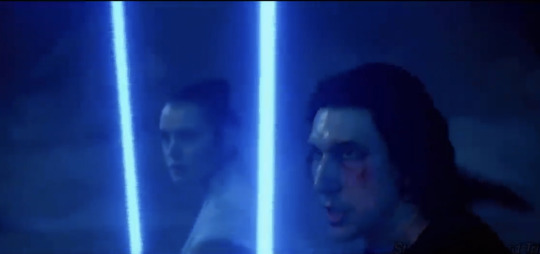
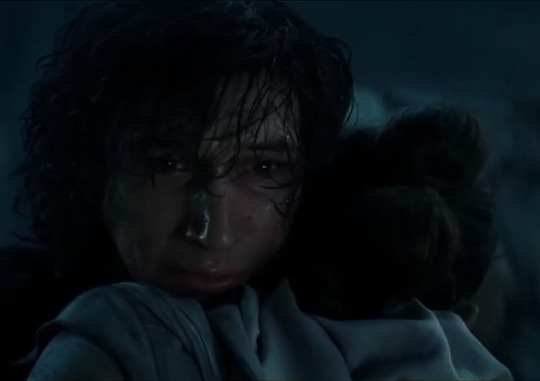
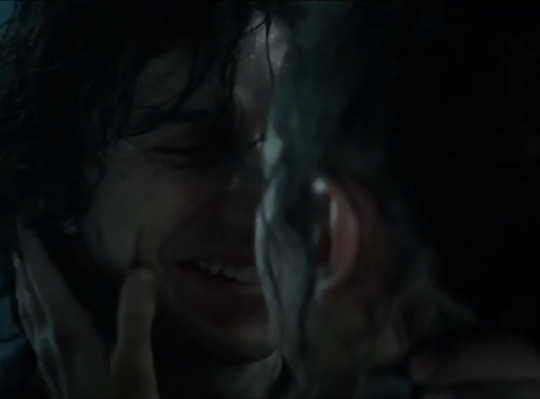
But TROS told us, told traumatized and neurodivergent children who saw themselves in Ben, that it wasn’t good enough. That love isn’t good enough. That doing the right thing deserves to be punished. That children tainted by violence and abuse and darkness don’t deserve love and healing even when they earn redemption, even when they do everything in their power to do the right thing and be brave. The hopelessness of that is what broke me as a person. That is not what Star Wars is about. Star Wars is about redemption and love and hope; TROS was about cruelty covered up with a thin sheet of materialism and confused, poor storytelling.
#*sigh* glad i got that out holy shir#ben solo deserved to live#ben solo defense squad#ben solo#rey from nowhere#rey solo#the only acceptable names for her#reylo#pro reylo#anti tros#tros review#pairing: ben x rey#ch: ben solo#ch: rey from nowhere#ch: rey solo#sw: text#my meta
396 notes
·
View notes
Text
FFVII and Xenogears - Cloud and Fei
So FFVII and Xenogears were in development around the same time. FFVII was released in 1997 and Xenogears was released in 1998.
A lot of the Xenogears story elements were “discarded” FFVII ideas. Mainly due to the fact they were seen as too dark for a FF game. Makes sense... have you played Xenogears?
**Major Spoilers for Both Xenogears and the FFVII Compilation**
This post will be about Cloud and Fei. I plan on also talking about the similarities in Jenova and Miang, the Highwind Scene vs. the SexiTime scene, and anything else I may think of randomly. Xenogears is still one of my favorite games of all time, and I actually think people may understand some of the themes in FFVII more if they played it or at least watched a playthrough of it.
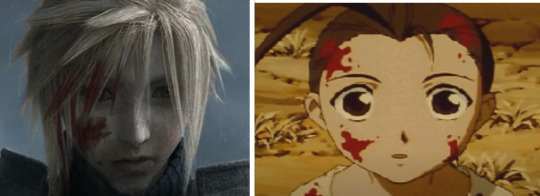
It is a T rated game, but it is definitely dark.
Some major similarities for Cloud and Fei:
The main protagonist of each game has amnesia and severe mental health disorders. FFVII and Xenogears do take slightly different approaches. Fei has full blown Dis-associative Identity Disorder which manifests in a physical form. It’s very Freudian. The “bad” persona, is called “Id”. Cloud creates a persona based on experiences he’s had... except....

Fei did that too, partially. His was due to extreme childhood trauma due to being experimented on... As we know, Cloud’s is due to Hojo being a total piece of shit....

Yeah, they were both experimented on. Fei’s is a lot more disturbing because his mother had been possessed by the “first woman” from the skies... And was having him experimented on, forcibly, while awake. (Don’t worry, there’s gonna be a post about Jenova and Miang too.) Fei was around 3, I believe, when his mother was possessed by Miang and started doing this.
And his mother sacrificed herself in order to defend him... you know... Like Zack did for Cloud....
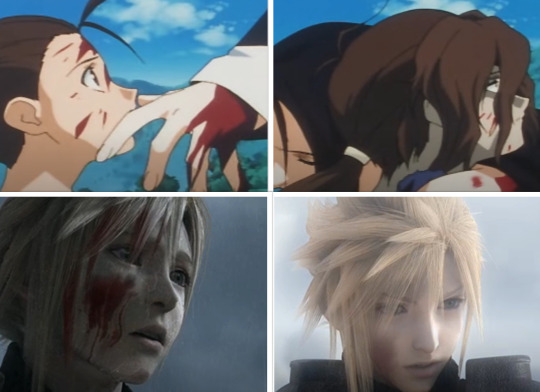
Fei watched his mother die in front of him just like Cloud watched Zack die in front of him. There’s also a major change in their appearance after it happens. Cloud closes his eyes at the end, opens them again, and hello, SOLDIER!Cloud. Fei’s hair will go in front of his face when he’s going to “turn in to Id.” You don’t know this until after towards the end of the game, when you realize it in Fei’s subconscious... Oh yeah...
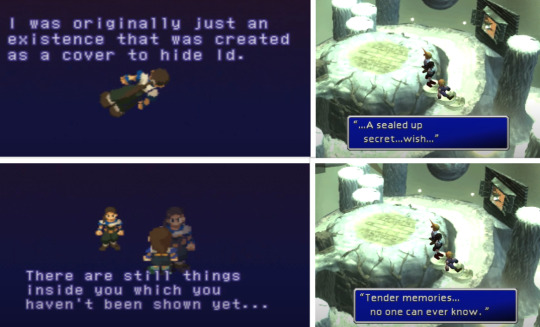
You also have to go in to Fei’s subconscious and merge his multiple personalities he’s created... However, you do this on your own. Elly does not come with you, in fact she’s not even allowed to be in the party at this point, which will also be covered in another post.
Fei’s father is around, though, and he has attempted in the past to help Fei by building him up enough to be able to handle this and be able to see what Id needed to show him.
Some of the differences, and areas where ideas “merged”:
Fei’s Id persona is a mean kid. He says he wants to destroy everything, he does destroy a lot of stuff and he’s just mean. He even has lines similar to things Sephiroth would say to Cloud.
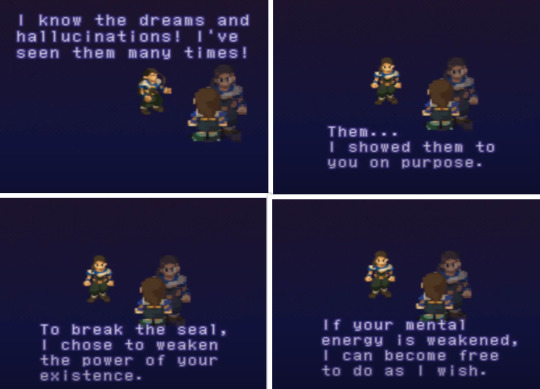
There’s also the happy persona inside of here - the one prior to the experiments and Miang possessing his mother, and he’s up there in the videos talking about his most treasured possession, which is a memory of him playing with his mother. He wouldn’t allow Id to see it.
Cloud’s persona is not as extreme in the differences. Cloud’s was somewhat medically induced due to the mako poisoning, Jenova cells, and just a ton of trauma. Fei’s was mostly built the way DID can normally pop-up, which is just pure childhood trauma. However, the Wave Existence (this game has a ton of blatant religious references, by the way), explains it VERY similar to how Cloud describes it about himself:
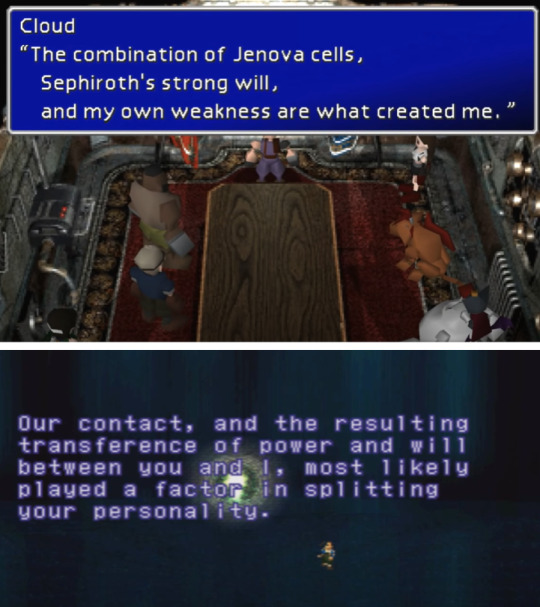
Fei and Elly reincarnate, so that’s a major difference here in terms of what they are talking about. Cloud’s is done to him directly, while Fei’s is due to some stuff that went on 10,000 years ago when everything happened on this world. The explanation during the entire scene in Xenogears is a lot to take in, but they do a very good job of explaining it. Yes, it’s still somewhat confusing, but I think because they used so much dialogue during this scene, you get a very good idea of what happened to the world, the Fei and Elly, and why things are they way they are.
Fei’s memories aren’t just from this life, but from ALL of his lives from 10,000 back to present.
Fei has an interesting response to what the Wave Existence says...
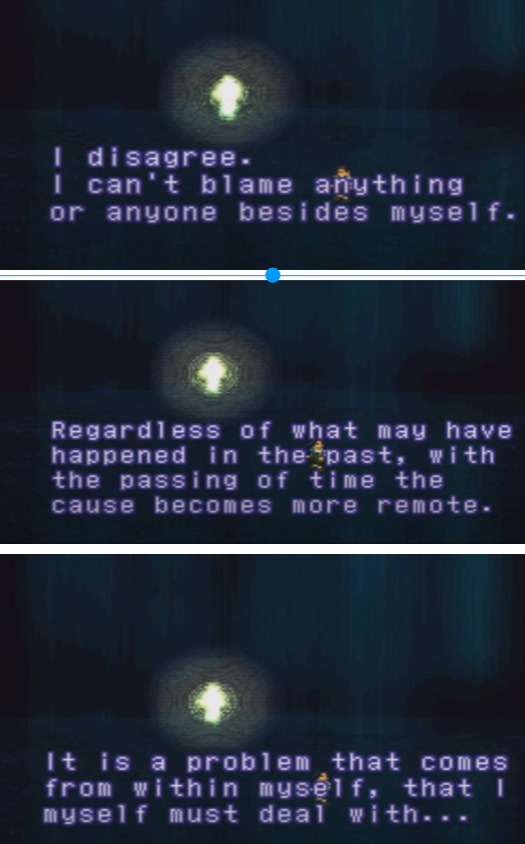
Fei is determined to get through this on his own.
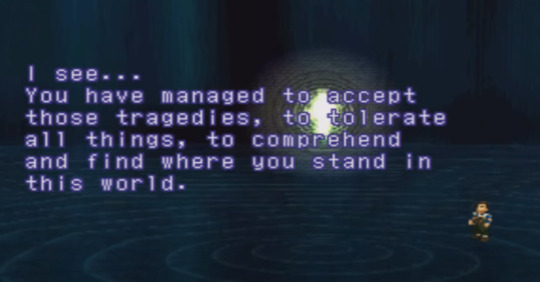
Hey Wave Existence, how come you didn’t go help Cloud out over in Advent Children? Would have been nice... Especially since Fei’s dad pretty much dies right after this is all over with.
Personality wise, Cloud and Fei are pretty different, fake persona or not. Fei is mostly confident, somewhat social, and much more optimistic. The persona that you play as is a very normal guy. The persona that he turns in to that you don’t realize is trying to kill you randomly in the game... he’s just pure rage and evil.
Cloud, as we all know, under his persona tries to act cold and uncaring. His true personality is that of an awkward ham wrapped in a cinnamon bun. However, he is very caring and will save anyone - under either persona, it seems.
Fei will too. It’s just more “obvious” with Fei, since he’s out going. Id will not save you, he will kill you. He will even try to kill Elly. Id doesn’t give a shit, he’s a honey badger.
If you’d like to watch the scenes where Fei explores what’s going on, you can watch them here:
Fei’s Mind Part 1
Fei’s Mind Part 2
I would absolutely recommend you wait to watch these if you haven’t played the game and want to, but if you want some more context on how things work with Xenogears, these would be interesting. Some of it may also be confusing unless you know some of the other stuff about the game, but they honestly do a pretty damn good job of giving you a breakdown.
Fun fact: The song that plays in Xenogears while you’re in Fei’s subconscious is called “The One Who is Torn Apart”. During Cloud’s subconscious journey, “Who Am I?” plays. You could ultimately put either song over either scene and it would get the same point across. Cloud’s is a bit more upbeat, but I’m going to see about doing that and how it impacts the emotion of the scene.
#xenogears#fei fong wong#cloud strife#cloud strife is a cinnamon bun#tifa lockhart#cloti#cloud x tifa mentioned#ff7#final fantasy 7#final fantasy vii#ffvii#ff7r#ff7 spoilers#xenogears spoilers#elly van houten#elhaym van houten#fei x elly
98 notes
·
View notes
Text
Young Link might have PTSD - Part 2: Termina is NOT a Parallel World, Technically
This is a continuation of my last post so if you’re seeing this and haven’t read it, go here.
This is the part where I somewhat smoothly segue into Majora’s Mask. Link, lonely and filled with unprocessed trauma, leaves Hyrule in search of Navi. According to most sources (which take from Hyrule Historia probably? don’t quote me on it), Link falls down a hole into Termina, a parallel world to Hyrule, that contains many familiar looking denizens of Hyrule, but playing different roles. And well, if you probably guessed by the title, I have a rather different interpretation.
Okay, so in a nutshell my theory is that Termina is in fact all a dream, kind of like Koholint Island. Except the one dreaming up this world isn’t some deity like the Giants or Skull Kid or the Moon. It’s Link.
(big explainey hoo hah below)
Evidence 1: Link begins the game sleeping. Yes, I know literally every Zelda game begins this way and it’s a whole tradition thing. I am beginning with the weakest points first and working my way up to the strong ones. We’ll get there.
Evidence 2: The reuse of character and environment models from Ocarina of Time. The literal IRL reason for this is of course the game famously being given only one year of production time, which meant that the most practical method was to reuse as much material from MM’s predecessor as possible (eg. Romani Ranch sign is the Kakariko Village sign, and still says Kakariko Village on it). It seems like a rather offhand afterthought for Nintendo to chalk it all up to “oh its just a parallel world like Link to the Past or something. But think of it like this; when we dream, we often see familiar people from throughout our lives put in strange and unexpected situations, like that irritable old farmhand you hated so much is now a depressed circus master for some reason. Dreams don’t make sense. Things you know will mix with other strange inexplicable things, fleeting thoughts in your mind, all roughly tied together by whatever emotions you had been feeling when you went to bed. Malon is split into two people, Romani and Cremia, her older and younger self. This might reflect how Link feels about Malon, that she changed so much in those 7 years that she’s like a different person entirely, that it’s hard for him to process that they are the same, because the change was so shockingly sudden for him.
Evidence 3: Gorons in the snow, Gerudo by the sea. Yes, I know that sounds a lot like good evidence for a parallel world (that’s why the idea is widely accepted in the first place, it has merit), but it also works in as dream world evidence too. As a child, my family was obsessed with skiing. We would go to the same mountain every winter, and we would stay at the same lodge. It almost became like a second home for me. So much so, that one night I dreamed that my house had been replaced by the lodge, so it wasn’t on a snow-capped mountain, but in a bushy Australian suburb. Okay that kinda got off subject but I’m bad at conclusions so in summary Dreams Just Be Like That (tm). You get what I’m saying right? No? Sorry, let’s just move on.
Evidence 4: The Milk Bar. AKA my favourite location in the game! It’s often overlooked as the “haha funny they couldn’t put alcohol in kids game so its kiddy milk hee hee”, but it is actually a strong thematic pillar of Majora’s Mask. As I mentioned in Part 1, if you put a 9 year old in a 16 year old’s body and call him an adult before ripping that all away is probably going to leave the kid with an identity crisis. What is a mature place open at late hours when children are sleeping? A bar. What is a drink associated with the young, being produced for the purpose of helping children grow? Milk. No please don’t go I swear there’s more to this, stay with me. In order to gain access to the bar, Link must prove he is mature enough by wearing a mask, a disguise, like Adult Link is to Young Link. Being adult isn’t earned through years of natural living experience and mental development, it’s a thing you are given by adults to just BE when they deem you worthy, at least from how Link sees it. So that is the amalgamation of dream thoughts that is the Milk Bar. Is it mature? Is it childish? What is the line between the two? Is there one? It’s the culmination of his anxieties and confusions that he doesn’t know how to express. Another, smaller expression of this anxiety is the Clock Town Guards. When Link is a Deku, the guards say they don’t allow children outside the gates. When Link turns back however, the guard goes to stop him because he looks too young, but sees that he has a sword, and lets him pass. Why the sword? Well, in one way this is a callback to Kokiri Forest, where Mido doesn’t let Link see the Deku Tree until he has a sword. But also, what is the item that lets Link travel through time and become an adult in OOT? The Master Sword. Link seems to believe that adulthood is measured by the things you have, physical markers of maturity, which is how lots of children see adulthood. You’re an adult if you can drink, if you’re tall, if you’re married, if you have a house, a car etc. But in reality this isn’t how it works. Heck, I’m technically an adult but I sure as hell don’t feel like one, because I know I still have things to learn about responsibility, patience and all the other things, that can only come with time, which is the moral conclusion of OOT, but clearly Link missed the memo. Don’t get me wrong, there are some indicators to show he’s grown a bit. He can ride Epona, use the bow, do flips like some kind of acrobat etc. But those strange and confused feelings linger, and manifest in the young boy’s dreams.
Evidence 5: The four transformation masks. The four masks represent different aspects of Link’s self, and the way he grew and changed in OOT. Deku Scrub the Innocent, Goron the Confident, Zora the Mature and Fierce Deity the Hero. Link began only knowing the Kokiri Forest, and nothing of the world outside. As he set out on his journey, he grew more confident in his skills and defeated greater foes. When evil took over, he learned from his fatal mistake and worked to right it. And when it was finally time to face the greatest threat, he was ready, with all the heart pieces, bottles full of fairies, Biggoron Sword in hand. At that moment he struck the final blow he probably felt like the strong and unstoppable hero everyone in Hyrule told him he needed to be. And that feeling of pure uncompromising strength, with the whole world behind him, manifested in the Fierce Deity. Fierce Deity is much taller than Adult Link, and packs so much of a punch that he can beat Majora without batting an eye, like some overpowered Super Saiyan. It reminds me a lot of Undertale, with young Asriel becoming what he imagines to be an all-powerful godlike being, like something you’d see as a children’s drawing. Fierce Deity gives off those vibes, like “he has a HUGE SWORD that SHOOTS BEAMS OF LIGHT and he’s 8 FOOT TALL and CAN KILL ENEMIES IN A SINGLE BLOW!!” Before the final battle on the moon, when Majora gives you the mask, he childishly asks if you want to play a game of good guys and bad guys. And the good guy always wins, no matter what. Fierce Deity makes the final boss a cakewalk, but its supposed to.
Evidence 6: Anju and Kafei. Short one, because it falls a lot into everything else I’ve said regarding childhood vs adulthood. Kafei is effectively a switcheroo of what happened to Link in OOT. An adult shrunk back to childhood, uncomfortable in his new body and looking for a way to fix everything. He’s a reflection of how Link now kinda feels like an adult in a child’s body, because he had started to be used to being called an adult.
Evidence 7: The Moon. I haven’t super touched on the main meat of the game yet, so here it is. The moon and the 3 day mechanic is an allegory for constant mounting pressure, that builds and builds, never ceasing, because the world is in danger, and there’s only one person who has been chosen to save it. I’ve always been interested in the Chosen One narrative, and how different media explore the idea of the world’s very existence being pushed onto one person. How at the end of it all, they can never be the same again after all they’ve gone through. When you’re somehow expected to hold up the Moon itself single-handed, and your life and everything you care about suffers because you’re putting everyone else before yourself. That feeling of complete loneliness under a crushing weight, and although other characters may come to help you, in the end its still all down to you, and you never had a choice in any of it, as all the decisions were made by someone else. You must do what they tell you. Believe in yourself, believe...
Evidence 8: Skull Kid. The story goes that long ago in Termina, the Skull Kid and the Giants played together, until one day, the Giants left, leaving the Skull Kid alone and heartbroken, with nobody to turn to. As life moves on, things may change, and people always come and go from your life. Your friend might move overseas, or stop texting you, or you might fall out of friendship after an awkward event from which you could never recover (no, these have totally not all happened to me, shut up i’m fine), or your fairy companion might just disappear without so much as a goodbye after their task is complete. And it feels like you didn’t matter at all. That they never really cared about you, and you’re as easy to drop and move on from as a child’s toy. You might get angry, and want to shut them out, and give them a taste of their own medicine. Majora’s Mask teaches you that this isn’t the case. Life is ever changing, but you will always have the memories of times with your friends, and a chance to make more with new friends, like a sassy talkative fairy sprite and her shy brother or a child made of wood who wants to destroy the world. Friends come from unlikely places, so accept that change will happen and hope that wherever the people you knew are, they’re okay. You’re thinking about them, so they might be thinking about you too. And who knows? Life is unpredictable. They might just come back one day, and it’ll be like they were never gone.
Evidence 9 (the final one, I promise): The Song of Healing. At the end of all things, after losing ones you love, connections to family and friends, memories of things long past... you need time to heal. Link’s journey through Termina is a constant gauntlet of running into his own past traumas, forced to relive them again, and again, and again. But sometimes you should take a deep breath, gather your thoughts, and take time to heal. Although it can be important to confront your fears and learn to surpass them, it is exhausting, and you can end up more emotionally broken than when you started. The three masks all had regrets of powerlessness; unable to protect your community, your loved ones, or even yourself. Troubles you’ve gone through that keep plaguing your mind, and you’re wondering if you’ve done enough, seeking answers where none can be found. And the best thing you can do... is accept and move on. Be kind to yourself, and give yourself time to heal. Link’s way of processing his grief and trauma is to create an entire hellscape world in his own head, but not everyone processes it the same way. Sometimes you feel like you need to busy yourself, or listen to soothing music, or talk to people you trust, or spend copious amounts of money, or make some angst art, or cuddle your plush toys until their stuffing squeezes out. Sometimes life hits you in the face and you want to blame yourself for standing in the firing line, but it’s not your fault. It’s okay to feel however you feel, whether you’re drenched in a pool of tears or you just feel numb, it’s okay and natural. You’re okay. You’re here.
Okay so it got kinda personal at the end there but I hope it was informative, and made you think a little bit differently about Majora’s Mask and Ocarina of Time. You probably want to go back and play them now. Me too.
So was this all just an excuse for me to gush about how cool Majora’s Mask is? Hell fucking yes it was. Congratulations for making it through my monstrous ramblings, you get the secret prize of looking at my weird art on my DA. Here you go. Have a nice day, Zelda Nerds.
#long post#legend of zelda#majoras mask#young link#fierce deity#zelda theory#wow i cant believe i never realised i wrote fuckig outset island instead of koholint im dumby af
24 notes
·
View notes
Text
TV of 2020
1) I May Destroy You

I May Destroy You might not have been written during the pandemic, but when it arrived in June it felt like the sort of complicated, cathartic show that could have been. Detailing one woman’s experience of rape and its aftermath, Michaela Coel (who wrote every episode) continually found rich narrative avenues in which to explore her characters’ individual experiences of sexual assault and consent. If that makes the series sound concept-driven, it always placed its characters first; the push-and-pull between Arabella, Terry and Kwame is key to the ways in which Coel’s tender, curious writing is able to explore power dynamics within relationships, friendships and hook-ups. Other, lesser shows that are this deliberately open-ended might feel opaque: it’s testament to the show’s confidence of voice that isn’t the case here.
2) Normal People

Like plenty of others, I binged the entire series of Normal People in a weekend, although one of its many pleasures is how Sally Rooney and Alice Birch’s adaptation teases out the episodic nature of the former’s bestseller. From Connell’s early days at university, to a Tuscan holiday turned sour, and an exchange year in Sweden, Normal People was about the ways in which the people we love move in and out of our lives over the years. It wasn’t immune to mis-steps (the show draws something of a crude line between the abuse Marianne suffers at home and what she seeks out in romantic partners), but the sheer emotional heft of the show was undeniable, nowhere less so than Paul Mescal’s floodgate-opening performance in Episode 10.
3) Adult Material
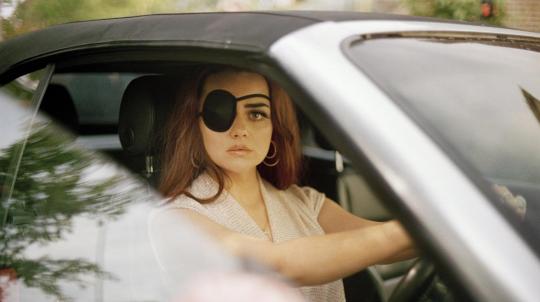
Perhaps one of the year’s most overlooked shows, Adult Material follows Hayley Burrows as she attempts to balance life as the harassed mother-of-three and the twilight years of her career as adult performer Jolene Dollar. The slyly comic edge of the first episode is quickly eroded after Jolene becomes embroiled in the abuse of another actor on-set. A stark portrait of alcohol abuse and loneliness, it’s also a sharp indictment of how little the so-called ‘culture wars’ surrounding pornography are meaningfully impactful on sex workers themselves. Hayley Squires gives the sort of white-hot star performance usually reserved for 90s Hollywood rom-coms, a veneer of frustration and resignation overlaying even her character’s most abrasive moments.
4) Cook, Eat, Repeat

Why not in this interminably shitty year, choose the one show that offered the sort of balm it’s impossible to reverse engineer? Following hot on the heels of a disappointing series of The Great British Bake-Off, Nigella Lawson’s warm, inviting half-hour new series was the televisual equivalent of a long bath and a facemask. Her fish finger bhorta, brown butter colcannon and black pudding meatballs have already made it into this household’s repertoire, but there’s something innately comforting about the luxurious silliness of Nigella that almost transcends criticism. Whether it’s the giddy nonsense of her liquorice box, the ‘did I hear that right’ moment when she revealed her pronunciation of ‘microwave,’ or the seductive self-care of making a creme caramel for one, no other show elicited such pure enjoyment from me this year.
5) I’ll Be Gone In The Dark
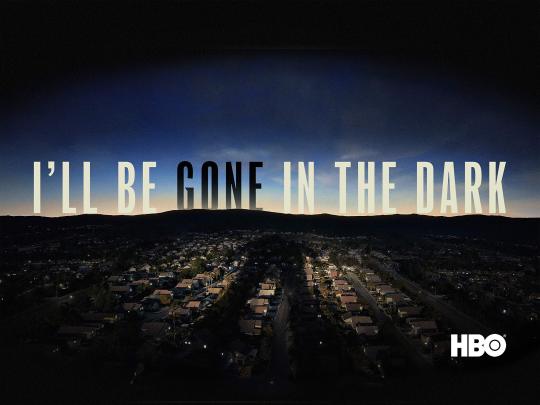
The true crime documentary series boom has increasingly leaned into a focus on the victims, from last year’s The Yorkshire Ripper Files to Jeffrey Epstein: Filthy Rich, but none so effectively or compassionately as I’ll Be Gone In The Dark. Less a story about the hunt for the Golden State Killer and more a study of trauma and obsession, the series splices together home footage of the late Michelle McNamara’s investigation with survivor testimony to create a haunting portrait of one man’s legacy of pain. The early episodes are replete with skin-crawling tension, anguish and tears, but the later episodes allow that to fall away, focusing on the mental fortitude necessary for the survivors at its centre and the sense of community fostered by meeting other women like them.
6)The Salisbury Poisonings
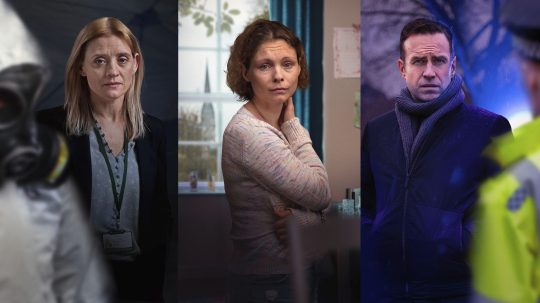
I had no interest in watching this BBC limited series initially: the advertising made it look dry, the story itself (the Novichok poisonings of 2018) seemingly devoid of juicy narrative material. That I’ve watched this three times in the space of a year speaks to its robust, urgent filmmaking. Like several other shows on this list, it arrived into the context of a pandemic it couldn’t have foreseen, but watching the rapid, careful response of local government (crucially and deliberately obstructed by Whitehall) to this crisis presented a sort of horribly watchable what-if scenario. What seemed at first blush to be middle-of-the-road programming evolved over three episodes into the sort of spare, quietly terrifying journalistic drama that invites comparison to last year’s Chernobyl.
7) We Are Who We Are
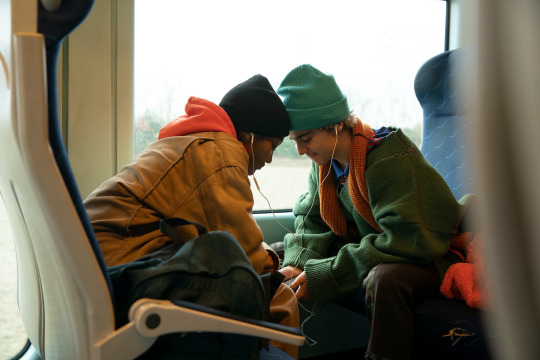
It turns out that Luca Guadagnino’s woozy, seductive style transfers perfectly to television, and despite We Are Who We Are lacking the timelessness that typifies I Am Love or Call Me By Your Name it thrillingly captured the turbulent adolescence of its teenage characters. Equally effervescent and raggedly emotional, the show’s joy always felt hard-won, bumping heads with the often cynical, unreadable motivations of the adult characters. A tender and frank depiction of queer identities within traditionally restrictive environments, it’s also a love letter to young friendship and the lifeline that can provide during our formative years. Spellbinding.
8) Selling Sunset
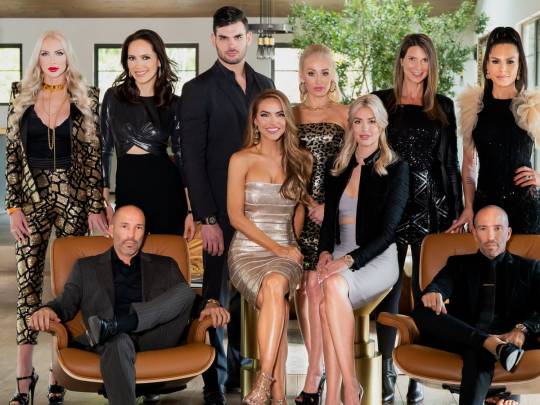
Perhaps the year’s most impressively constructed reality show, I was slow on the uptake with Netflix’s Selling Sunset only to have it take over my life for a few weeks during the summer. Manufactured reality series are tough to get right, but much like The Hills (surely this show’s biggest influence) Selling Sunset gains a lot of mileage from gaming pre-existing friendships for maximum impact. Christine and Mary’s beleaguered relationship and, obliquely, their respective responses to fame continued to provide wildly watchable fireworks, but the build-up to Chrishell’s separation from husband Justin Hartley was exquisitely handled. Suddenly Davina’s strangely uncharismatic shit-stirrer and Christine’s predictably OTT wedding were forced to take a back seat to something approaching genuinely moving television. Trying to tease out what was real and what wasn’t, and following the ways this all spilled out onto social media, was pure, unmitigated pleasure in a year sorely lacking in just that sort of unfettered escapism.
9) My Brilliant Friend
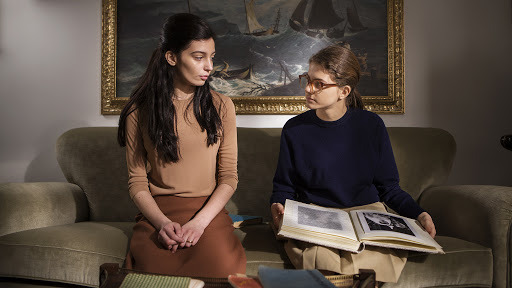
Two seasons in and there might not be another character on TV that I’m as continually frustrated and fascinated by as Lila, the eponymous ‘brilliant friend’ of the show’s title. Sparingly warm, often cruel, seductive, Season 2 of HBO’s masterful adaptation sees her trapped in a loveless, abusive marriage but as ever it’s her fractured relationship with Lenù that forms the emotional spine of the show. There’s often a strange sort of snobbery around the term ‘prestige drama,’ as if all that money on the screen is a smokescreen for a dearth of anything to say; My Brilliant Friend uses every colour in its paintbox to portray the yawning void that opened up between Lenù and Lila as they entered adulthood, from the lavish, provocative outfits Lila’s adopts after she marries Stefano to Max Richter’s evocative score and the detail poured into the show’s supporting characters. Rewardingly complex.
10) Mrs. America
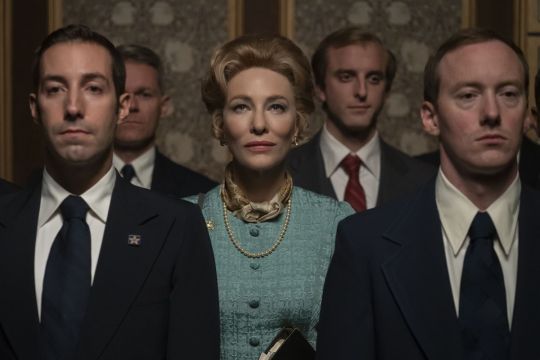
I laboured over what would take my tenth spot this year since there was so much TV that I loved, and especially this year so much of it felt essential to how I was receiving the world around me. Ultimately, Mrs. America’s mixture of astute political commentary, character-driven writing and host of enjoyable performances tipped the scale in its favour. Cate Blanchett’s all-timer of a performance as Phyllis Schafly understandably received the majority of attention, but Mrs. America gave us so many memorable moments: Sarah Paulson’s Alice ringing the bell at reception whilst high, Uzo Aduba’s Shirley Chisholm speaking to a potentially bugged hotel ventilator, Margo Martindale’s Bella Abzug quietly realising she’s no longer the radical of her youth on a busy New York street. This sort of deft, smart political drama isn’t often this much fun to watch, and what an ending...
11) This Life
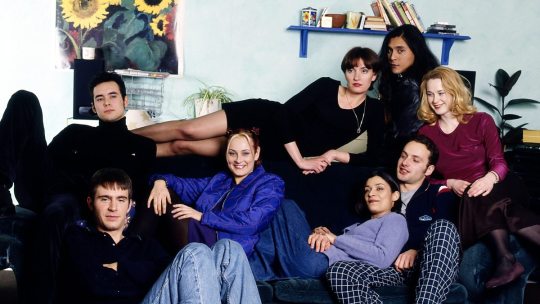
An honourable mention to a show made almost twenty-five years ago that nevertheless helped define the year in TV for me. Shows that were once considered part of the zeitgeist can often feel quaint and old-fashioned in retrospect, but Amy Jenkins rambunctious flatshare drama isn’t one of them. Whilst it can sometimes feel like the show’s characters are universally adverse to making even one good decision between them, there’s a compassion and care underpinning This Life that means it never comes across as overly cynical or sneering. There’s also a lot to be said for discovering a performance that you genuinely consider to be one of the best of the decade, and no other character this year frustrated and moved me in the ways that Daniela Nardini’s Anna did. Bonus points for the genuinely chaotic final episode, perhaps one of the best I’ve ever seen.
And FWIW, these are ten performances from shows not on the list above that I loved this year: Marielle Heller in The Queen’s Gambit, Nicholas Hoult in The Great, Sarah Lancashire in Last Tango in Halifax, Poorna Jagannathan in Never Have I Ever, Michael Sheen in Quiz, Imelda Staunton in Talking Heads, Leila Farzad in I Hate Suzie, Alison Pill in Star Trek: Picard, Gillian Anderson in The Crown and Andy Allo in Upload.
And ten episodes of TV that I loved too: ‘Terry and Korvo Steal a Bear’ (Solar Opposites), ‘The Gang Deals With Alternate Reality’ (The Good Fight), ‘Uncle Naseem’ (Ramy), ‘The View From Halfway Down’ (Bojack Horseman), ‘The Vat of Acid Episode’ (Rick and Morty), ‘I Am’ (Lovecraft Country), ‘No Small Parts’ (Star Trek: Lower Decks), Seven-Spotted Ladybug’ (Everything’s Gonna Be Okay), ‘Daytona’ (Cheer), ‘Whenever You’re Ready’ (The Good Place).
6 notes
·
View notes
Photo
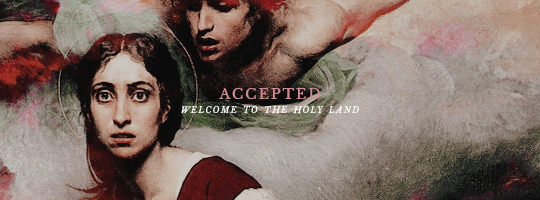
CONGRATULATIONS, EMMA! YOU’VE BEEN ACCEPTED FOR THE ROLE OF DMITRI.
Admin Cas: There’s something so tragic about Dmitri that I love: everything about him is a contradiction. Yet, for all his love and light, he’s also really quite terrifying, and the way you balanced both of those aspects of their character was truly breathtaking, Emma. I thought your reflections on the idea of Dmitri as a sort of wingless angel was especially impressive. In spite of all the things that make them angelic, they can never truly be one with God’s angels. That, after all, is what sets him apart from their brethren; where they are ruination, he is its saving grace. I put this golden prince in your hands without fear that you’ll do wonderful things with him, and I can’t wait to see the directions you’ll go together! Please create and send in your account, review the information on our CHECKLIST, and follow everyone on the FOLLOW LIST. Welcome to the Holy Land!
OUT OF CHARACTER
Alias | Emma.
Age | 21+.
Personal Pronouns | She/Her.
Activity Level | I’m able to get a reply or two out at least once daily; depending on length, it could potentially be more or less than.
Timezone | Eastern.
Triggers | REMOVED.
How did you find the group? | LSRPG tag.
Current/Past RP Accounts | I delete my character accounts to create a blank blog for my next character account. I save snippets of threads I adore, so I’m so sorry. RIP - xoxo
IN CHARACTER
there is a swelling storm and i'm caught up in the middle of it all and it takes control of the person that i thought i was the boy i used to know.
CHARACTER
Dmitri , the Horsemen of Conquest
DRAW TO CHARACTER
I’ve never been the type to write a sample for a character before fleshing out the other bits first, but Dmitri’s voice whispered, begging to be explored as soon as I read their biography. The first sample you’ll read below was the initial picture I painted and kept throughout this application because Dmitri resembled that of a poor Icarus, who simply overindulged in something not meant for him to enjoy.
I imagined Dmitri in the seconds after creation gasping at the sights of Heaven, reaching back for white wings — only to be met by their bareback. Shoulders aching for the flight of angels, the purity evident in their veins to be his own, God’s presence given at a moments notice.
Yes — I very clearly drew these small, delicate details from a few lines, but Cas wrote this character in such a way I felt the weight of Dmitri’s needs as if they were my own to be met. The biography held me captive to do whatever would be in my ability to give this character justice for what they were never gifted. I still get butterflies reading over the biography and couldn’t stop what followed.
This application is my confession of love for Dmitri, and I would even offer to say this could be read as a fever dream because isn’t that what God would want? His beloved, lastly mad Horsemen to be written in a state of complete and total euphoria for conquest and recklessness… but more importantly, I hope to show how beautifully flawed this character is to desire to be loved by a dead God, and the journey I would take them on to realize their purpose was never tied to God’s needs.
FUTURE PLOTS
SUMMARY: I’ve written these in a format of progression based on what I think could occur first in-game based off of current connections, and Dmitri’s direct link of being a Horsemen, making it far more likely to push said plot first. Each builds upon the other in a sense of a video game character skill branching system. As in, I’ve written some answers or may propose them in a way, which would directly change a plot below it. Hope this helps explain the mess which is about to occur below!
FUTURE OF THE HORSEMEN
what happens to those who were meant to end a world already destroyed?
Their purpose set forth to them by God has come to no fruition as the world destroyed itself, at least in a way. Each Horsemen dealing with their new identity as a mercenary in their own way, but I can only speak from the perspective of Dmitri. When it comes to them, the Horsemen are family. They came from the same Gos as them, shaped from different moments but important just the same. Their future as a whole could be explored by each Horsemen’s motivation. For Dmitri, the idea of leaving them to go elsewhere seems far-fetched at first; a type of daydream when the cleanup after a job is too heavy to stay focused on. If given a bigger glimpse at something else, something Dmitri could find himself desiring to do, I imagine the Horsemen could find a strain.
FUTURE OF THE HEALING
what is the purpose of being one of healing if you watched the wounds be inflicted?
Building upon a strain forming within the Horsemen, Dmitri would first need to experience something so terrifyingly out of character for them to do, which could trigger a wave of events to follow. The concept of using their healing ability seems to be the “fun” direction as this golden boy not being able to save someone caught in the crossfires would be an angst ridden thread to experience. I want to shape his tenderness in a way to correlate with his healing. Dmitri’s process of healing someone is something I haven’t ventured much into yet — but I imagine the sight of it to be something beautiful, almost too beautiful to fully understand what you’re looking at. This light bringer among those who only bring darkness is the difference enough to push the first plot and this one forward.
FUTURE OF THE LOVED AND WORSHIPPED
what does one do with love and praise when all they expected was hate?
Imagine the first time someone witnessed Dmitri healing a mortal. Who was it? What occurred? No one who lives now among the mortals knows, yet their growing affection towards him makes me feel as if he’s gotten his own personal tale passed between them. Here in this new found love among men, I think Dmitri sees what he’s always wanted out of life, rather existence. It’ll be such a wild ride of secret trips to different parts of the world to see if he finds this love and praise everywhere. He’d be drunk over this, but there also comes the dark side of being given something kept from you for so long. Yes, I would love for this beautiful, precious Horsemen to ride happily off into the sunset… but there’s definitely some trauma left from God. Here within this, I find Dmitri’s breaking point could take place and all of the above could shatter.
Are you comfortable with killing off your character? | yes — given a month’s notice and option to decline? i feel as if the answer would be different depending on how they were to die and character development, if this makes sense.
IN DEPTH
but there is a lightin the dark, and i feel its warmth
in my hands and my heart why can't i hold on?
CHARACTER MOTIVATION
It’s unknown at first- their motivation. Perhaps, God always intended the existence of those who were meant to cause the end of the world to possess no motivation. Life to them, the Horsemen, was simply a story already written down in the stars, yet Dmitri walked out into the New World with the story finished and no part to play in it. Purgatory had warped their glowing essence, satisfying God’s need to prevent prayers said to Conquest over the God of Creation.
Yet motivations can still be rather fickle when they were never intended for you. Dmitri’s creation came from the infinite love God felt for man, yet they were never meant to have this (this being love) as their backbone. No, they were to indulge their fellow Horsemens’ wrath by mending the blows they were destined to cause. Their gift, their healing, their voice. All things given by God to serve a purpose not their own. Somewhere between all of the havoc and chaos of this world, there had to come a time where Dmitri sought to figure it out.
Their motivation laid rotting within the crevices of darkness and filth they called home all these centuries. Purgatory did it’s job more so than God could have ever intended because Dmitri struggled with purpose outside of God’s. Sunshine filled his veins in a way the darkness fed off of and merely left the Horsemen of Conquest bare. So walking out of, rather escaping from, Purgatory to Dmitri awakened this desire for answers. With the death of God, Dmitri discovered their rebirth into something rather ungodly as he wanted to become everything God never intended on him to be: loved.
From this death, Dmitri has discovered a solace with mortals he’d never found with the fellow Horsemen as there’s something to be said in regards to being made last. He didn’t resemble the others completely as he felt a mirror to man more so than his Horsemen. I imagine actions and motivation for him to be teetering currently as his own questions in the regards of ‘what’s next?’ as having a calling as a mercenary never sat well with him. He wants to be loved in a way God had left unspoken between them over the possibility of competition.
SUMMARY: Throughout interactions and inner thoughts expressed throughout this roleplay, I would love to dive into the future plots tying into Dmitri’s motivations above with the balance of being deemed as loved or worshipped. Dmitri needs to be loved, yet I think if it ever rocked towards him being worshipped, it’d be a nice little shift of what truly motivates him. Overall, I find my motivating factor to be Dmitri’s voice and relationships with the Horsemen due to my overall understanding of how much he truly values them. Yes, he’s always wanted more for himself, but there’s always going to be the glimpses of why he is among their ranks. He isn’t pure as the angels or as mischievous as the demons, but I find Dmitri’s complexities something of value as a character in a world without restraints.
IN-CHARACTER PARA SAMPLES
i. DREAMS AND THE HEREAFTER
‘Icarus, my son — your wings are too brittle for the warmth of light. Now, I shall watch you burn with the rest.’ Or was the name spoken across the lips of God dmitri? Did he curve the appetite of man’s undeserving love of their creator by existing? Were his screams - for more - not enough to make the tear from God’s eye a regret?
‘But father, I shall fly with you. We can escape together. No mortal shall ever have to look upon our faces again. We can finally be--’ Scorned brow silenced all of his pleas, bringing the truth to the forefront. Dmitri dreamed before the tear was ever caught and molded into the literal form of his being. They knew of themself from the perspective of God’s eye and convinced themself of something which wasn’t there. ‘Am I never to be free of this burden then? Am I to suffer?’
They painted a world where they crawled from the depths of Purgatory, where their strength came from the purity of man, where God Himself welcomed Dmitri back into Heaven as if he’d never gone. In this recurring dream, God would realize the mistake to tuck away his most prized creation.
The final Horsemen did not deserve the caverns of impermeable darkness Purgatory supplied them because somewhere in the infinite of his existence, he truly believed himself to bare wings.
‘Suffer? Suffer! You are the brilliance of life; my creation. Do you wish to know what I plan to do with you? Follow me, Conquest. Your domain awaits.’
Their eyes open with horror, memories of a man - rather a god who loved him less. A god who created him by mistake. An outstretched arm from active slumber finds its way back onto their chest, an unsteady rise and fall of breaths lost. His own torment from sleep a self-given punishment as he allowed himself to fall into the corners of his own mind. The hidden doors which locked memories long forgotten as he believed himself to be more than he was.
God regretted shedding a tear for out came the brightest of shadows, the technicolor snake of dispute in the form of a golden angel. They were truly no closer than their brethren to bearing wings, but if one deserved them, Dmitri would declare themself so.
Instead of wings, however, cascading down their back, you would find a seeping hole of nothing; a hollowed out mine of what could have become of them. It is the wickedness they hide beneath enchanting smiles, minor suggestions, and lack of resolve which will keep their back bare. Denial being a sort of game which they’ve mastered over the years.
Once, one might have spotted the prospect of gold, sinless existence within them, but they were not created like the other angels, the other horsemen, the other fallen. They were made as the result of emotion, and one knew what followed closely with emotions — mistakes or rather the sins of man.
They were the rotten cavities created over years of divulging in sweets, buried in the crevices of newborn teeth who hadn’t the taste of sugar.
And in their devastation, Dmitri destined themself to find the answers which God withheld from them.
ii. DENIAL IN THE FORM OF SINFUL BEAUTY
“You’re late — again.” A simple nod towards either Nerissa or Viktoria felt enough to find his place among his family, his fellow Horsemen.
One thumb found its way to his temple before releasing a heavy sigh. “Dreams haunt me recently.
“You mean nightmares.” Nerissa could never resist correcting him over something so miniscule as words, yet this simple exchange caused a growing irritation to sprout wings and turn into complete rage.
His temples tensed, nostrils flared with fingernails already cutting at the skin of his palm. “You honestly think I’m mortal enough to switch the meaning of two words, War?” Tongue pressed against the back of their teeth, Dmitri allowed their body to sink into their assigned chair, of sorts. Each had a place within the others home as if each home belonged to all four of them collectively.
“Someone woke up feeling out of place again.” Always Ryuk with a quick word before letting the storm brew on.
“It’s the dreams — I wake up in horror over...” Their eyes, washed in an array of gold, scanned the softness of their palms, the lack of scars on their flesh, the harrowing displacement of havoc in their words, and the deficiency of darkness their fellow Horsemen possessed. “...for it is the dream I can never grasp.”
With the unblemished palm, he wiped away at both of their eyes, trying to remove the hints of sleep behind them. More importantly, he wanted more than anything to remove any attempt of truth being proven by Nerissa’s words.
Harsh snarled laughter came from the corner of their domain, mocking their spiral for something less than what it was. To Dmitri, they saw these dreams as something more of an awakening, uncovering their last moments with God.
“What is the point of man if not to suffer, dear Dmitri?”
“But I am no man!” Fists shattered the monotony of the discussion, calling in the last ounce of sanity any of them could take as they stood from the table. “I am no god.” The once golden irises, which mirrored the glory of the sun’s warmth, now mimicked the lava spewing from a devastating volcano. “I am Conquest, and I shall suffer no more!”
Here in the brilliant, pure light of their anger, their risen voice, the very might of their denial gave birth to something else.
A soft chuckle from the other side of the room destroyed any build up between the others as Viktoria waltzed over to them.
“He’s not wrong… None of us are man, so none of us shall suffer.” Viktoria’s hand draped over theirs with a tenderness they’d only felt from the mortals, but it was enough to show Dmitri the horsemen had the ability to give him what he wanted.
2 notes
·
View notes
Text
Nier Automata and Bosses
In a previous post I mentioned Nier Automata and lumped it in with other action games, purely for the sake of illustrating a point. Originally, I had just a single aside discussing why this wasn't entirely correct but that doesn't do Nier: Automata nor its themes justice. If you haven't played Nier: Automata, don't read this post. The story this game tells is one that must be felt, not spoiled.
Nier Automata's combat is, at first glance, identical to others of its genre – a fast paced action hack-and-slash: it is all about looking good, taking out enemies quickly and with diverse weapons, although admittedly there is less focus upon movesets. The enemies are that same league of faceless-yet-personable with their own bestiary entries to build up basic stories about them. Bosses all have a story you briefly witness before leaving them a husk of metal and shrapnel and bolt off to your next target. In short – combat is fun, it exists to make you feel empowered, the story it tells is one of a hero fighting “evil”. At least, at first. Because, as the story progresses the combat becomes less about empowerment, and more a commentary upon the futility of war, the cyclical nature of violence, the faceless personas we adopt to distance ourselves from our part in violence.
At first you are 2B, a fast melee fighter who slices enemies asunder with various blades; then, you are 9S who hacks into them and blows them up from the inside out, getting a peek into their psyche as you do so; and finally, you play as A2 who is a more frantic version of 2B barely in control, and who's entire arc is a tragedy of trauma. In many ways, she is the inevitability of 2B. These disparate elements are but a small part of Nier Automata's whole; all of it designed and made in such a way as to make the player think. To feel.
As 2B your first fight against any boss or enemy may reveal a bit about them, but not much. After all, she doesn't care to know: and neither have you, in both this game and in games you've played prior. Brief introductory cutscenes serve to set the scene and build up a brief characterisation for a boss you are about to beat down, to differentiate them from the swathes of enemies you have already cut through and to establish them as “unique”. It always feels more triumphant to defeat a boss, in many respects an entity and character more whole than the basic enemies. But as the game progresses and she comes to realise her mistakes, so do you the player and this intrinsic linking of avatar and player only aids in this gut-punch.
Then as 9S facing against these same bosses and experiencing the story from his perspective, you hack in and explode them. 9S is passive in his violence, as he is passive in his role in YorHa, constantly following orders: this is established first through his gameplay. But, in hacking you also gain access to their innermost thoughts -ones which shouldn't exist according to your superiors-, which at once feels candid and cruel: you are laying bare their most personal moments. This too is violence framed as dehumanisation. Then, where there would usually be triumph and a feeling of power upon defeat you instead feel guilt – this boss you have mindlessly cut through once already was a thinking, feeling being. You cut through them, witnessed their inner workings, and destroyed them still. The final nail in this thematic coffin is that as you progress, regular -and once faceless- enemies too, reveal their own thoughts and processes. Every enemy you have defeated in this game, showering in a construct of their viscera, has been their own living, sentient being. Is it war, or genocide?
Finally as you near the final route and play as both 9S and A2 boss stories, feelings and ruminations are brought to a close and tied with a ribbon, further elaborating upon prior revelations and turning your slaughter from power-trip into guilt trip. Not only that, but the psyche of acting in an inescapable conflict is explored, A2 is the inevitability of what 2B will become; marred by war and scarred by what she has had to do, scrambling to insist she doesn't feel. She exists as a foil for that first arc, both in terms of narrative and in how 9S approaches her in polar opposite to how he revered 2B. As he loved 2B, he hates A2- she becomes an easy conduit for his rage and guilt, an easy work-around to exploring his own emotions. He becomes his emotions.
These 3 different combat styles not only tell a story about each character -one a soldier, one a technician, one an unstable rebel - implicitly, but turn repeated fights against each boss into less a triumph of perfect runs and more a dissonant, unpleasant task. You begin to feel less a hero and more a murderer. Surely, as violence and war should make one feel, and as it is making these characters feel? The join-the-dots of dodged attacks, preferred weapon sets and “perfect” runs becomes more of a scramble for survival as you juggle new elements of both gameplay and story. As you process the new information, and personality, these bosses -these characters-, are getting. That first time defeating a boss you might feel triumphant - “I've done it!” - and that final time you go up against them, you might instead feel “oh god, what have I done?” as their story, personality, and tragedy is revealed.
This, again, is a deliberate design choice: the themes of the game are present not only within the narrative but within the very elements of play themselves, creating a cohesive whole that reveals itself as the game goes on. The steady tragedy of Nier: Automata isn't only in witnessing characters you love come to harm but in realising you are complicit within this harm. But, like them, you have no choice but to act. If you do not destroy as you develop, the game will not progress.
All of this exists to build up the tragedy of Nier: Automata and its stories. It is all built up, and linked through both narrative and combat, portrayed as inescapable and inevitable.
6 notes
·
View notes